#olive oil essential fatty acids
Explore tagged Tumblr posts
Text

Seafood Cioppino
Ingredients:
▫️Seafood:
* 1 pound salmon fillet, cut into chunks
* 1 pound mussels, scrubbed
* 1 pound shucked oysters
* 1/2 pound cleaned and deveined shrimp
* 6 anchovy fillets, minced
▫️Broth:
* 1 quart fish broth or clam juice
* 1 cup dry white wine
* 1 large onion, chopped
* 2 cloves garlic, minced
* 2 carrots, chopped
* 2 celery stalks, chopped
* 1 bay leaf
* 1 teaspoon dried oregano
* 1/2 teaspoon red pepper flakes
* Salt and pepper to taste
Instructions:
▫️Rinse the mussels under cold water and discard any with open shells that don't close when tapped.
▫️In a large pot, heat olive oil over medium heat. Add the onion, garlic, carrots, celery, bay leaf, oregano, and red pepper flakes. Cook until softened, about 5 minutes.
▫️Pour in the fish broth (or clam juice) and white wine. Bring to a boil, then reduce heat and simmer for 15 minutes.
▫️Add the salmon chunks, mussels, oysters, and shrimp to the pot. Cover and cook until the mussels open and the salmon is cooked through, about 5-7 minutes.
▫️Discard any unopened mussels. Season with salt and pepper to taste. Serve hot with crusty bread for dipping.
This dish offers numerous health benefits. It is rich in omega-3 fatty acids from the salmon, which support heart health by reducing triglycerides, improving blood pressure, and decreasing inflammation. Also, salmon, mussels, and oysters are excellent sources of lean protein, essential for building and repairing tissues, boosting metabolism, and maintaining satiety.
Furthermore, oysters and mussels are packed with essential vitamins and minerals like zinc, selenium, iron, and B12, crucial for various bodily functions, including immune health, cell growth, and energy production. Moreover, the healthy fats in salmon and seafood provide energy, support brain function, and maintain healthy skin and hair.
#foodie#food photography#food fight#food foodie#comfort food#fast food#healthy food#food for thought#food#foodpics#foodmyheart#foodlover#tw food#lunch recipes#pasta recipes#pasta recipe#salad recipes#soup recipe#recipe#reciprocidade#reciprocity#recipies#recipes#cozy autumn#cozy art#cozyhome#cozy cozy#cozy mystery#healhtylifestyle#healthy salad recipes
58 notes
·
View notes
Text
Ways to use magickal oils: for witches and non-witches
In your beauty routine:
Depending on the carrier oil, spell oils can be a great addition to skin care and hair care! Some carrier oils provide a lot of skin and hair benefits.
Castor oil contains triglycerides, which help maintain moisture in the skin. This can help with dry skin. Castor oil can also be applied generously as a hair mask and wash off, or apply very liberally to the ends of hair to help with frizz. This is depending on hair type.
Grapeseed oil is an effective treatment to decrease split ends. On the skin, grapeseed oil can help with breakouts, treat dry skin, and gently fade some scars. It’s also non-comedogenic meaning it won’t clog pores. This could be a good option for someone with oily skin.
Sweet almond oil has a lot of vitamins, minerals, fatty acids, and antioxidants that can sooth both the skin and hair. It can help approve the appearance of dry and irritated skin.
Jojoba oil is anti-inflammatory and can reduce redness, help with chaffing, and keep skin calm. For hair, it can strengthen hair strands and reduce hair porosity buildup. It is both antifungal and antibacterial.
Sunflower seed oil can make hair shiny and strong. It can help tame frizz as well as treat dandruff. When used on the skin, it can help skin retain moisture.
*Always be wary of your skin sensitivities and allergies when buying or making your own oil blends.
Ways to use them in your beauty routine:
Add a few drops to your bath for aromatherapy.
Mix a few drops into your liquid soap (great for cleansing and/or protection!)
Mix a few drops in your palm with your favorite lotion. Rub it into your skin while saying affirmations.
Deposit a few drops through your hair while damp.
Dab it on your pressure points to use as perfume.
If you make soap, add a few drops into your soap for a magickal boost.
In your cooking:
Some carrier oils can be great to cook with! *Make sure not to add essential oils to these blends and use food safe herbs. You’re responsible for your own allergens.
Olive oil is already a pantry staple for many people. Try making an oil blend steeping your favorite kitchen herbs and spices in olive oil to use in your cooking.
Avocado oil is another great oil you can do this with if you prefer.
Coconut oil is solid at room temperature, but that doesn’t mean you can’t use it as an oil blend. Heat up the amount you want in a pot and add your herbs. Keep the heat low to infuse your herbs then place into a jar to solidify.
In magick:
Oils are super versatile and they’re a staple for many witches. The most common way they’re used is to anoint candles for spells and rituals. This can even go as far as anointing deity candles as an offering.
They can also be used to anoint objects. By taking a small amount of oil and rubbing it onto an object, you can add energy and charm it with your intention. This works for talismans as well.
You can also anoint yourself! Certain points on the body can be anointed depending on your intention. Anoint your throat with a confidence oil before giving a presentation to aid in communication; anoint your forehead with a psychic oil to aid in divination; anoint your pressure points with a love oil to draw someone in.
The possibilities are endless.
#witchblr#witches of tumblr#witch community#witchcraft#book of shadows#grimoire#magickal oils#spell oils#ritual oil
72 notes
·
View notes
Text

nurturing my natural self (part 4)
Disclaimer: I made this, like all my other posts, for myself, but if you are reading this, I'm not a doctor, and this is basic researched knowledge. If you realize that you need help, please seek a doctor!



Allowing Your Hair to Recover
Nurturing your hair is just as important. This allows your natural hair to breathe and thrive. While protective styles like braids, wigs, and weaves can be great, they can also harm your hair if you don't give it a break. It's crucial to find a routine and products that work for your hair type and porosity.
I want to grow my hair out so I can wear it more often, but I’ve struggled to find styles that suit my current length after chopping off my dead ends. Cutting those damaged ends felt like a weight lifted off my chest! I’m investing in my hair care and currently have a protective style in, but I’ll switch back to my natural hair once it’s out.
I’ve found more styling ideas on TikTok, which helps since it can be tough to find looks for my length. My hair is a bit longer than the TWA (teeny weeny afro) stage and is growing well. The health of my hair is very important, and I plan to continue adding to my routine.

- Nutrients: Protein: Essential for hair structure (lean meats, fish, eggs, legumes). Omega-3 Fatty Acids: Support scalp health (fatty fish, walnuts, flaxseeds). Vitamin A: Promotes sebum production for a healthy scalp (carrots, sweet potatoes). Vitamin C: Supports collagen production and iron absorption (citrus fruits, berries). Biotin: A B-vitamin crucial for hair growth (eggs, nuts, avocados). Vitamin E: Improves blood circulation to the scalp (nuts, seeds, leafy greens).
- Hydration: Drink plenty of water to keep your hair and scalp hydrated.
- Scalp care: Cleansing, exfoliation & massage: using a gentle shampoo, keep your scalp clean to prevent build-up, which can hinder growth. occasionally exfoliate your scalp to remove dead skin cells and promote circulation (started using aztec clay, 10/10 so far, loving it). massage your scalp to stimulate blood flow and promote hair growth.
- Moisturizing Oils: jojoba, argan, grapeseed & avocado oil. These help hydrate hair by adding moisture and nutrients. Apply these oils to damp hair to hydrate it, either as part of a deep conditioning treatment or after washing.
- Moisture-Sealing Oils: castor oil, coconut oil, olive oil, avocado (serves as both) & shea butter. These create a barrier to lock in moisture and prevent dehydration. Use these after applying a moisturizing oil or treatment to lock in the hydration, focusing on the mid-lengths and ends of the hair. I don't use these much if at all unless I'm focusing on the ends of my hair because of my scalp condition.
- Heat Management: If you’re using heat, always protect your hair. Heat protectants are a must to prevent damage from styling tools. Try to minimize heat use overall or stick to low-heat settings.
- Detangling: a major part of healthy hair care. Always use a wide-tooth comb or your fingers (if using both, then use your fingers first), and make sure your hair is wet with conditioner to prevent breakage.
- Seasonal Hair Care: your hair’s needs can change with the seasons. In the winter, it might need more moisture, while summer humidity might require lighter products.
- Avoid Harsh Chemicals: Choose sulfate-free shampoos and conditioners to avoid stripping natural oils. reduce or avoid harsh chemical treatments (e.g., relaxers, dyes) that can weaken hair.
- Protective styling: using low-manipulation styles to protect your ends (braids, twists) can help prevent breakage. styles that are too tight can lead to traction alopecia.
- Hair care ingredients: it's important to find what works for you. what works for kayla may not work for kiara, yk? for example, i've read and heard about others who benefitted from Coconut oil, shea butter, castor oil, jojoba oil, rosemary oil, and mint oil are examples of hair care ingredients known for their nourishing, moisturizing, and growth-stimulating properties. While not all of these oils are beneficial for managing my seborrheic dermatitis, certain ones, like jojoba oil and rosemary oil, have been especially helpful in controlling flare-ups.
- Routine: Find a fitting routine for your type and porosity. A general one is: shampoo + condition + rinse + leave in + style OR shampoo + deep condition + rinse + leave in + style . People include pre-poo (pre-shampoo) to detangle, some people even condition their hair before deep conditioning. this can actually cause your deep conditioner to be less effective. my current routine to which pre-pooing will be added: detangle with water + shampoo/aztec clay mask w acv + deep condition + rinse + leave-in conditioner + blow-dry on low heat. this is to prep my hair for like braids or something but if i was doing a wash n go, i wouldn't bow dry, i'd style with either a curl custard and gel or a hair butter (to lock int he moisture) + gel since i already used leave-in.
- Trims, Patience, and Stress Management: Regular trims are necessary to keep split ends at bay. Managing stress and getting enough sleep can make a huge difference in your hair’s health. And remember, patience is key—healthy hair growth takes time!



Some ingredients to beware of:
- Sulfates (e.g. Sodium Lauryl Sulfate): Strips natural oils, causing dryness.
- Parabens (e.g. Methylparaben): Preservatives that may disrupt hormones.
- Silicones (e.g. Dimethicone): Can build up on hair, leading to dullness.
- Alcohols (e.g. Isopropyl alcohol): Drying effects on hair.
- Formaldehyde (e.g. DMDM Hydantoin): Can cause irritation and allergic reactions.
- Artificial Fragrances: Can irritate sensitive skin and cause allergic reactions.
- Harsh Detanglers (e.g., Sodium Lauryl Sulfate, Cetrimonium Chloride): Can strip moisture and cause buildup.



Hair Care Essentials
- clarifying shampoo (deeply cleanses to remove buildup, excess oil, and impurities. Ideal for occasional use to refresh hair but can strip natural oils with frequent use.)
- hydrating shampoo (gentle cleansers that don’t strip natural oils; look for hydrating formulas.)
- co-wash (cleansing conditioner that helps remove dirt while maintaining moisture, suitable for regular use. i.e. when you wanna wash your hair but it's too soon use shampoo bc you don't wanna dry it out)
- conditioner (moisturize and detangle hair after shampooing.)
- blow dryer (better than air drying, esp useful for when you're doing styles that require dry hair)
- spray bottle (refresh, dampen, moisturize)
- plastic cap (to hold your hair when you put hair masks on)
- leave in conditioner (retain moisture and detangle hair.)
- deep conditioner/hair mask (Used weekly or bi-weekly to provide intense moisture and repair. choose one best suited to your hai-- what your hair needs the most in the moment)
- hydrating creams & oils (shea butter, coconut oil, or argan oil to nourish and moisturize.)
- natural oils: coconut oil, olive oil, jojoba oil, or castor oil can help seal in moisture, add shine, and promote hair growth.
- essential oils: tea tree oil, lavender oil, and peppermint oil can help with scalp health and stimulation.
- curl creams or gels: defining curls, providing hold, and reducing frizz.
- edge control & brush sleek edges and maintaining hairstyles.
- hair mousse: volume and lightweight hold.
- wide-tooth comb: for detangling without causing breakage & combing out.
- detangling brush: for detangling (denman, unbrush etc)
- fine-tooth comb: sectioning and parting hair
- satin or silk scarves/bonnets/pillowcases: protect hair from friction while sleeping, reducing frizz and breakage.
- hair clips and bands: sectioning hair during styling and care routines.
- heat protectant spray or cream: if you use heat styling tools (like flat irons or blow dryers) to protect your hair from damage.
- trimming tools: scissors handy for regular trims to remove split ends and encourage healthy growth.
- scalp massager: promote blood circulation and stimulate hair growth.
- scalp Treatments: tea tree oil for dandruff or other scalp concerns.

masterlist
#cherubofthenight#nymphetofthenight#loassumption#loa#hypergamy#divine feminine energy#loa success#success story#affirmations#femininity#self care#self improvement#natural hair#black princess#black girl magic#black is beautiful#natural hair care#type 4 hair#4c#4b#4a#curly hair#coily hair#Spotify#this is a girlblog#girlblogging#clean girl#dream girl#girlhood#girly tumblr
27 notes
·
View notes
Text
How-to: Stay healthy while on a calorie deficit
Meal Ideas Breakfast:
Egg White Omelet with Veggies
3 large egg whites: ~51 calories
1 cup spinach: ~7 calories
1/2 cup mushrooms: ~8 calories
1 small tomato: ~16 calories Total: ~82 calories
Greek Yogurt with Berries
1/2 cup non-fat Greek yogurt: ~50 calories
1/4 cup fresh berries: ~20 calories
1 tsp chia seeds: ~20 calories Total: ~90 calories
Lunch:
Zucchini Noodles with Marinara and Lean Turkey
1 medium zucchini (spiralized): ~33 calories
1/2 cup marinara sauce: ~60 calories
3 oz ground turkey (lean, cooked): ~150 calories Total: ~243 calories
Vegetable Stir-Fry with Tofu
1 cup bell peppers: ~24 calories
1 cup broccoli: ~55 calories
1/2 cup zucchini: ~17 calories
1/4 block firm tofu: ~94 calories
1 tsp olive oil: ~40 calories Total: ~230 calories
Dinner:
Salad with Grilled Chicken
2 cups mixed greens: ~10 calories
1/2 cup cucumber: ~8 calories
1/2 cup cherry tomatoes: ~15 calories
3 oz grilled chicken breast: ~140 calories
1 tbsp balsamic vinaigrette: ~30 calories Total: ~203 calories
Vegetable Soup
1 cup vegetable broth: ~10 calories
1/2 cup carrots: ~25 calories
1/2 cup celery: ~8 calories
1/2 cup green beans: ~20 calories
1/2 cup white beans: ~100 calories Total: ~163 calories
Snacks:
Sliced Veggies with Hummus
1/2 cup carrot sticks: ~25 calories
2 tbsp hummus: ~70 calories Total: ~95 calories
Apple Slices with Nut Butter
1 small apple: ~55 calories
1 tbsp almond butter: ~98 calories Total: ~153 calories
Supplements and Nutrient Boosts Make sure you don't lose out on your essential vitamins, those are crucial for your physical and mental health - for example, some help get rid of brain fog, insomnia and/or trouble staying asleep **and you'll feel more energized which means you'll be able to move around more!** + workouts! (You don't want your muscles to hurt when you're working out.)
Multivitamin: Covers daily nutritional gaps, including essential vitamins and minerals.
Omega-3 Fatty Acids: supports heart health and reduces inflammation.
Vitamin D3: vital for bone health and immune function.
Magnesium Supplement: supports muscle function and prevents cramps. (it also helps with period cramps!)
Calcium Supplement: crucial for bone health and muscle function. MUST have optimal levels of calcium at all times, trust me, hypocalcemia is no fun.
Probiotics: aids digestion and gut health.
B-Complex Vitamins: supports energy metabolism. **no, calories in pills DON'T COUNT.**
Workout Routine
Focus Areas: Building Muscle, Slimming Tummy, Burning Fat
1. Strength Training (3-4 times a week):
Deadlifts (3 sets of 8-10 reps): Full-body strength, focuses on legs, back, and core.
Squats (3 sets of 12-15 reps): Targets legs and glutes, helps build lower body strength.
Lunges (3 sets of 12-15 reps per leg): Engages glutes, hamstrings, and quads.
Push-Ups (3 sets of 10-12 reps): Strengthens chest, shoulders, and triceps.
Plank (3 sets, hold for 30-60 seconds): Core exercise that also engages shoulders and glutes.
Russian Twists (3 sets of 20 twists): Focuses on obliques and core, helps slim the waist.
2. Cardio (4-5 times a week):
High-Intensity Interval Training (HIIT):
20-30 minutes per session, alternating between intense bursts (e.g., sprinting) and short recovery periods (e.g., walking).
Steady-State Cardio:
30-45 minutes of moderate intensity (e.g., jogging, cycling, swimming).
3. Core-Specific Workouts (3 times a week):
Bicycle Crunches (3 sets of 15-20 reps): Engages the entire core.
Leg Raises (3 sets of 15 reps): Targets the lower abs.
Mountain Climbers (3 sets of 20 reps): Full-body cardio move with core focus.
4. Flexibility and Recovery (2-3 times a week):
Yoga or Stretching: 20-30 minutes of flexibility exercises to enhance recovery and prevent injury.
Total Daily Calories
Average Calorie Intake: ~900-1200 calories This range is low, so it’s very important to monitor how your body responds and adjust as needed to avoid negative health effects.
Important Reminders:
Listen to Your Body: Regardless of what's promoted in the community, or how quickly you see others reacing their GW's, always prioritize your health over rapid results. If you feel fatigued, dizzy, or unwell, it’s essential to reassess your calorie intake or exercise intensity.
Stay Hydrated: Drink plenty of water throughout the day to stay hydrated, aid digestion, and support overall metabolism. (no, energy drinks and coffee doesn't count)
Rest and Sleep: Ensure you’re getting 7-9 hours of quality sleep each night to support recovery and overall well-being.
Self-Compassion: Remember that progress takes time. Be kind to yourself and celebrate every small victory along the way. You don't just become the butterfly overnight. Turn it into a lifestyle, rather than a fast road.
BONUS: How to get through a plateau Hitting a weight loss plateau can be frustrating and discouraging, but it's a common part of the journey. Here’s how to overcome it: 1. Reassess Your Calorie Intake
Track Your Calories: Double-check your food portions and calorie counts. As you lose weight, your body needs fewer calories, so what worked before might need adjusting.
Create a Small Calorie Deficit: If you’ve been consistent with your calorie intake, consider reducing it slightly—by about 100-200 calories per day. ~~~~~~~~~~~~~~~~~~~~~~~~~~~~~~~~~~~~~~~~~~~~~~~~~~~~~~~~~~~~
Metabolism Days!!!
Prevent Metabolic Adaptation: When you're on a calorie deficit for an extended period, your body can adapt by slowing down your metabolism. Metab days help to "trick" your body into thinking it's getting enough fuel, which can prevent or reverse this slowdown.
Boost Hormones: Eating more can temporarily boost levels of leptin, a hormone that plays a key role in regulating hunger and metabolism. Higher leptin levels can help increase energy expenditure.
Mental Break: It provides a psychological break from restrictive eating, making it easier to stick to your overall diet plan.
How to Implement Metab Days
Increase Calories: On metab days, you increase your calorie intake to maintenance level or slightly above. This can be an increase of 300-500 calories depending on your usual intake.
Focus on Carbohydrates: Many people use metab days to increase their carbohydrate intake because carbs can have a more significant impact on leptin levels. This might include adding foods like whole grains, starchy vegetables, and fruits.
Frequency: Metab days can be done once a week or once every two weeks, depending on your dieting strategy and how long you’ve been in a calorie deficit.
Stay Active: Continue with your regular exercise routine, as this will help ensure the extra calories are used effectively and support muscle growth and recovery.
Example of a Metab Day Plan
Breakfast: Whole-grain pancakes with fruit and a dollop of Greek yogurt.
Snack: A smoothie made with banana, oats, and almond milk.
Lunch: Grilled chicken wrap with avocado, lettuce, and a side of sweet potato fries.
Snack: Handful of nuts and a piece of fruit.
Dinner: Salmon with quinoa and roasted vegetables.
Dessert: A small portion of dark chocolate or a fruit salad.
Benefits
Prevents Plateaus: By occasionally boosting your calorie intake, you help keep your metabolism more active, which can prevent weight loss plateaus.
Improves Energy Levels: A day with more food can help restore energy levels, making it easier to maintain high-intensity workouts.
Supports Mental Health: It provides a mental break from constant restriction, which can improve adherence to your diet in the long term.
Caution
Avoid Overeating: The goal is to eat more than on a typical day, but not to binge. Keep the increase controlled and within a reasonable range.
Monitor Progress: Track how your body responds to metab days. If you notice consistent weight gain, you may need to adjust the frequency or calorie increase.
Metab days can be a useful tool in a structured weight loss or fitness plan, helping to maintain a healthy metabolism and support long-term success. ~~~~~~~~~~~~~~~~~~~~~~~~~~~~~~~~~~~~~~~~~~~~~~~~~~~~~~~~~~~~~~~
2. Shake Up Your Workout Routine
Increase Intensity: Push yourself a bit harder in your workouts. Try adding more weight to strength training or increasing the speed/intensity of your cardio.
Incorporate HIIT: High-Intensity Interval Training is effective for breaking plateaus. Short bursts of intense exercise followed by rest can boost your metabolism.
Change the Type of Exercise: If you’ve been doing the same workouts for a while, your body may have adapted. Try a new activity like swimming, boxing, or cycling to challenge different muscle groups.
3. Prioritize Strength Training
Build More Muscle: Muscle burns more calories at rest than fat, so incorporating more strength training can help rev up your metabolism. Focus on compound movements like squats, deadlifts, and bench presses.
4. Revise Your Macros
Adjust Protein Intake: Ensure you’re getting enough protein, as it helps preserve muscle mass while you lose fat. Consider increasing protein slightly while reducing carbs or fats.
Consider Carb Cycling: This involves varying your carbohydrate intake on different days—higher carbs on workout days and lower carbs on rest days.
5. Manage Stress Levels
Stress and Cortisol: High stress can increase cortisol, which may lead to weight gain or hinder weight loss. Incorporate stress-reducing activities like yoga, meditation, or even simple deep-breathing exercises.
Adequate Sleep: Lack of sleep can affect hunger hormones and lead to weight gain. Aim for 7-9 hours of quality sleep per night.
6. Hydrate Properly
Drink More Water: Sometimes, the body retains water, which can mask fat loss. Drinking more water helps reduce water retention and supports metabolic processes.
7. Cycle Your Caloric Intake
Calorie Cycling: Vary your calorie intake throughout the week. For example, eat at maintenance level (or slightly above) for a couple of days and then go back to a deficit. This can prevent your metabolism from adapting too much to a low-calorie diet.
8. Mind Your Eating Habits
Avoid Mindless Eating: Be mindful of snacks and portion sizes. It’s easy to consume extra calories without realizing it.
Intermittent Fasting: Consider trying intermittent fasting, where you eat all your meals within a specific time window (e.g., 8 hours). This can help control calorie intake and improve insulin sensitivity.
9. Evaluate Your Overall Health
Check Hormonal Balance: Hormonal issues like thyroid dysfunction can contribute to a plateau. If you suspect a problem, consult with a healthcare provider.
Check for reproductive issues - such as PCOS (can make you gain weight easier and/or have a hard time losing weight)
Consider Metabolism Testing: Some fitness centers or health clinics offer metabolism testing, which can give you insight into how many calories you should be consuming.
10. Stay Patient and Persistent
Reframe the Plateau: Understand that a plateau is your body’s way of adjusting to new changes. It’s a sign that you might need to mix things up but doesn’t mean your progress has stopped permanently.
Track Non-Scale Victories: Pay attention to how your clothes fit, your energy levels, and your body measurements. Progress can be happening in ways other than the scale.
11. Consider a Break
Diet Break: Taking a break from a strict calorie deficit for a week or two (eating at maintenance) can reset your metabolism and reduce stress, making it easier to resume weight loss afterward.
12. Stay Consistent
Stick to Your Plan: Even if the scale isn’t moving, staying consistent with healthy eating and exercise is crucial. Over time, the plateau will likely break.
Remember, patience and consistency are key. Weight loss plateaus are normal, and with the right adjustments, you can push through and continue progressing toward your goals. This isn't talked about enough here, and if this helped anyone, then it's what makes me the happiest. You don't have to make yourself get sicker, just to feel valid. Remember, being healthy and having your vitamins in check is most important, as your energy levels will be optimized. More energy -> more moving around -> more calories burnt!
#sw33tspo#sw33tspø#ana trigger#th!gh gap#an0r3c1a#ana buddie#4norexi4#4na buddy#ana advice#ana rant#sk1nny aesthetic#sw33tsp0#tw ana diary#⭐️ving#body ch3ck#ana meal#ana bllog#ana tricks#ana tips#4namia#an4r3xia#ed advice
15 notes
·
View notes
Text
Can certain foods or supplements help with weight loss?
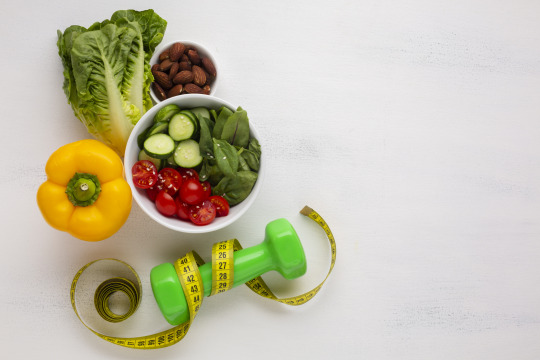
Certain foods and supplements can support weight loss, but they aren’t magic solutions. Here’s the scoop:
Foods
High-Protein Foods:
Chicken & Fish: Lean meats are great because they provide high-quality protein without too much fat. Fish like salmon also provide omega-3 fatty acids, which can promote fat loss and improve metabolic health.
Tofu & Legumes: These are excellent plant-based protein sources. They help maintain muscle mass during weight loss and keep you full for longer periods.
Fiber-Rich Foods:
Whole Grains: Brown rice, quinoa, and oats are packed with fiber. They take longer to digest, keeping you full and reducing the urge to snack.
Fruits & Veggies: Apples, berries, broccoli, and carrots are low in calories but high in fiber and nutrients. They help maintain steady blood sugar levels, preventing energy crashes and hunger pangs.
Beans: Black beans, lentils, and chickpeas are great for adding bulk to your meals without adding too many calories. They are also high in protein.
Healthy Fats:
Avocados: Rich in monounsaturated fats, they can help regulate appetite hormones.
Nuts: Almonds, walnuts, and pistachios provide a good balance of protein, fiber, and healthy fats, making them perfect for snacks.
Olive Oil: Using olive oil in moderation instead of butter or other fats can support weight loss by providing healthy fats that help with satiety.
Green Tea:
Contains catechins, which may help boost metabolism and increase fat burning, especially during exercise. Drinking a few cups a day can contribute to overall calorie burn.
Water-Rich Foods:
Foods with high water content can help you feel full with fewer calories. They are also generally low in energy density, which means you can eat larger portions without
Supplements
Green Tea Extract:
This supplement contains concentrated doses of the beneficial compounds in green tea. It’s often used to increase fat oxidation during exercise and enhance metabolic rate.
Glucomannan:
A natural dietary fiber derived from the root of the konjac plant. It absorbs water and expands in your stomach, making you feel full and reducing calorie intake.
Protein Powder:
Useful for people who struggle to get enough protein through food alone. It helps with muscle repair and growth, which can boost metabolism since muscle tissue burns more calories than fat.
Caffeine:
Found in coffee, certain teas, and supplements. It can enhance fat burning and boost metabolic rate in the short term. However, it’s important to consume it in moderation to avoid negative side effects like jitteriness and sleep disturbances.
Probiotics:
These beneficial bacteria can improve gut health, which is increasingly recognized as playing a role in weight regulation. Some strains of probiotics may help with weight loss by improving digestion and nutrient absorption.
Key Points to Remember
Balanced Diet: No single food or supplement can replace the benefits of a well-rounded diet. Incorporating a variety of nutrient-dense foods is essential.
Exercise: Physical activity is crucial for burning calories, building muscle, and improving overall health.
Consistency: Sustainable weight loss comes from long-term changes in diet and lifestyle, not quick fixes.
Medical Advice: Always consult with a healthcare provider before starting any new supplement, especially if you have underlying health conditions or are taking other medications.
Combining these foods and supplements with a healthy lifestyle can help you achieve and maintain your weight loss goals more effectively.
Note: "Burn Fat 24/7 with This All-Natural Weight Loss Solution!"
#weightloss#weight loss#fatloss#lose weight#diet to lose weight#healthy#health#fat loss#fatlosstips#losing weight#weight loss supplements#weight loss motivation#weight loss success stori#weight loss tips#lose weight fast#intermittent fasti#i need to lose so much weight#i need to lose this weight#i need to be weightless#fat loss transformation#weight loss journey#how to lose weight#weight management#dieting#weight loss foods#fat loss foods#weight loss recipes
7 notes
·
View notes
Text
Best Diet Plan for Over 40: Essential Guide by Nutritionist
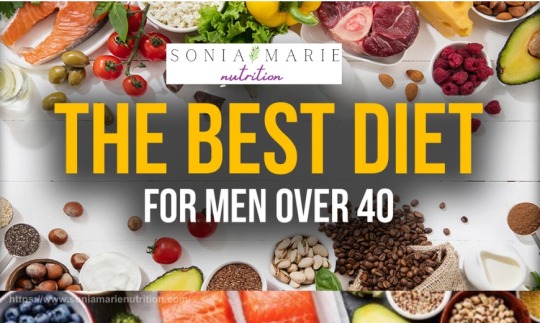
The Best Diet for Women Over 40: Essential Guide by Sonia Marie Nutrition
As women enter their 40s, nutritional needs shift to support changes in metabolism, hormonal balance, and overall health. This stage often brings new challenges, including maintaining a healthy weight, managing energy levels, and promoting bone strength. Sonia Marie Nutrition knows what is required of Diet for Women Over 40 with professional nutrition guidance. A well-balanced diet can empower women to feel their best, embrace healthy aging, and maintain vitality.
Understanding Nutritional Needs After 40
Aging naturally impacts metabolism, causing it to slow down, and hormonal changes related to perimenopause and menopause often follow. These changes make nutrient-dense foods crucial for maintaining energy, muscle tone, and metabolic health. Three nutrients particularly beneficial in this stage are calcium, fiber, and antioxidants. Calcium is essential for bone health, fiber aids in digestion and supports heart health, while antioxidants protect cells from damage, promoting overall wellness. The best diet plan for women over 40, these nutrients help in managing weight, strength maintenance, and long-term health.
The Role of Hormonal Health in Diet
Hormonal fluctuations can influence weight, energy, and even mood. Foods rich in phytoestrogens—found in flaxseeds, soy, and legumes—may help balance hormones naturally. Additionally, incorporating omega-3 fatty acids from sources like fish, chia seeds, and walnuts can support mood stability and reduce inflammation. A diet rich in nutrients can also help ease symptoms associated with menopause, including hot flashes and fatigue. Adopting a well-rounded, nutritious diet helps maintain hormonal balance, which is crucial for women navigating these natural changes.
Key Components of the Best Diet Plan for Women Over 40
The best diet plan for women over 40 emphasizes whole foods, balanced meals, and nutrient diversity. Key components include lean proteins, healthy fats, and complex carbohydrates. Protein is essential for muscle maintenance and metabolism, while healthy fats (such as those found in avocados and olive oil) support brain function and hormone production. Complex carbs—like whole grains, sweet potatoes, and legumes—offer sustained energy and stabilize blood sugar levels. A variety of colorful fruits and vegetables also ensures a broad intake of vitamins, minerals, and antioxidants.
Weight Management Strategies
Weight loss after 40 can be challenging, but it’s achievable through a combination of diet, exercise, and mindful eating. To lose weight, creating a moderate calorie deficit while prioritizing nutrition is key. Incorporating high-fiber foods and protein-rich meals can promote satiety, reducing the likelihood of overeating. Physical activity, particularly strength training, is also crucial as it helps maintain muscle mass and boosts metabolism. These combined efforts make weight management more sustainable and rewarding.
Personalized Nutrition Plans
A personalized approach to nutrition addresses individual goals, health needs, and food preferences. Sonia Marie Nutrition specializes in creating customized plans to suit each woman’s unique lifestyle. Personalized plans can focus on specific areas like weight management, hormonal balance, or enhancing bone health. By tailoring each diet plan to individual needs, women are empowered to achieve their best health outcomes effectively and enjoyably.
Common Myths About Dieting After 40
Misconceptions about dieting often circulate, especially concerning aging. For example, it’s a common myth that metabolism declines sharply after 40, making weight loss impossible. In reality, while metabolism is slow, balanced nutrition and regular exercise can significantly improve metabolism and overall health. Another myth is that restrictive diets are necessary to lose weight, but overly restrictive diets can harm metabolic health and make it harder to maintain results. A positive, balanced approach to food and exercise is far more effective for lasting wellness.
How Can Top Nutritionists Help with the Best Diet Plan for Women Over 40?
Working with a nutritionist like Sonia Marie Nutrition, who has over 30+ years of experience, provides invaluable support in navigating dietary changes. They offer expert insights into specific nutrients, portion sizes, and food choices that align with each woman’s health goals. Services offered include personalized diet plans, ongoing guidance, and meal planning strategies. With professional guidance, women over 40 can confidently manage their health, improve energy, and enhance quality of life.
10 Best Diets for Women Over 40, According to a Dietitian
Mediterranean Diet
The Mediterranean diet focuses on whole foods like fruits, vegetables, whole grains, lean proteins, and healthy fats, especially olive oil. Known to support heart health, it’s rich in antioxidants and anti-inflammatory nutrients, which help manage aging-related issues like joint health and hormonal balance.
DASH Diet (Dietary Approaches to Stop Hypertension)
The DASH diet is designed to reduce high blood pressure but offers benefits for women over 40 by emphasizing fruits, vegetables, lean proteins, and low-fat dairy. This diet also limits sodium, helping to improve heart health—a vital focus as the risk of heart disease increases with age.
Plant-Based Diet
A plant-based diet focuses primarily on whole, plant-derived foods while limiting animal products. High in fiber, antioxidants, and phytonutrients, plant-based diets are excellent for hormone health, weight management, and reducing risks of chronic conditions.
High-Protein Diet
After 40, maintaining muscle mass becomes a priority, and protein plays a crucial role in this. A high-protein diet—emphasizing lean meats, fish, eggs, and plant-based proteins like legumes and quinoa—supports muscle tone, metabolism, and bone health.
Anti-Inflammatory Diet
This diet includes foods that reduce inflammation, such as berries, fatty fish, leafy greens, nuts, and olive oil. Chronic inflammation is linked to numerous health issues, including arthritis and heart disease. Following an anti-inflammatory diet can alleviate joint pain and support overall health.
Intermittent Fasting
Intermittent fasting (IF) focuses on when to eat, rather than what to eat. Popular IF patterns, such as 16:8 (fasting for 16 hours, eating within 8 hours), have been shown to help with weight loss, blood sugar control, and energy levels, especially beneficial as metabolism slows with age.
Low-Carb Diet
Low-carb diets can be helpful for women over 40 aiming to manage weight or improve insulin sensitivity. Reducing refined carbs and increasing protein and healthy fats can stabilize blood sugar levels, reduce cravings, and support weight management.
Paleo Diet
The Paleo diet emphasizes foods our ancestors ate, like lean meats, fish, vegetables, and fruits, and excludes processed foods, dairy, and grains. It’s nutrient-dense and can help women over 40 improve digestion, energy, and metabolic health.
Flexitarian Diet
A Flexitarian diet encourages primarily plant-based foods but allows for occasional meat and dairy. This approach provides the benefits of a vegetarian diet while offering flexibility. The diet supports heart health, reduces the risk of certain cancers, and helps with weight management.
Ketogenic Diet
The Keto diet, while restrictive, can be effective for women over 40 looking to manage blood sugar and shed pounds. By drastically reducing carbs and increasing fat intake, the body shifts into ketosis, using fat for energy. It’s best followed under professional guidance to ensure nutritional needs are met.
Book Online consultation with Sonia Marie Nutrition today

Conclusion
A balanced diet that meets the evolving nutritional needs of women over 40 promotes overall health, vitality, and wellness. By incorporating whole foods, key nutrients, and tailored support, women can feel empowered to live healthily as they age. Sonia Marie Nutrition offers personalized guidance to help each woman achieve her health goals effectively and sustainably.
Ready to prioritize your health and wellness? Book a free 15-minute consultation with Sonia Marie Nutrition today! Whether you’re in the USA, Canada, or Australia, contact us directly at (818)-864-6540 or email [email protected] for personalized support.
#Best Diet for Women Over 40#best diet plan for over 40 female#diet plan for women over 40#Best Nutritionist in USA#Canada#Australia
2 notes
·
View notes
Text
Ultimate Guide to the Best Keto Diet Food List: Top Foods to Stay in Ketosis

The ketogenic diet, commonly known as the keto diet, has gained immense popularity for its potential to help with weight loss, improved energy levels, and overall health. At the core of this diet is a high-fat, low-carb approach that shifts the body into a state of ketosis. To succeed on this diet, it’s essential to know which foods are best suited for it. In this article, we'll provide you with the best keto diet food list that will help you stay on track and achieve your goals.
Think you know the keto diet? Test your knowledge with our interactive quiz! 🧠💪 Find out how much you really know. Take the quiz now.
What is the Keto Diet?
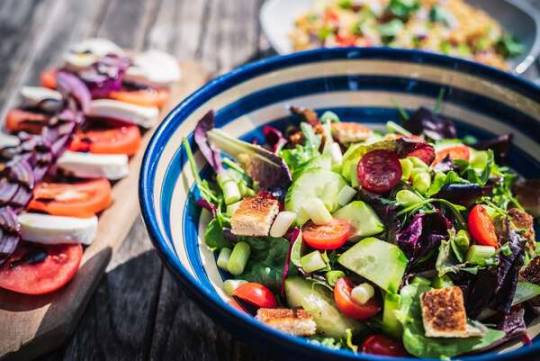
Before diving into the best keto diet food list, let’s briefly understand what the keto diet is. The keto diet involves drastically reducing your carbohydrate intake and replacing it with fat. This reduction in carbs puts your body into a metabolic state called ketosis, where fat, instead of carbohydrates, becomes the primary fuel source.
Benefits of the Keto Diet
The keto diet offers several benefits:
Weight Loss: By cutting down carbs, the body burns fat for energy.
Improved Mental Focus: The brain uses ketones, which are produced during ketosis, as a fuel source, leading to better mental clarity.
Stable Blood Sugar Levels: The keto diet can help manage blood sugar levels, which is beneficial for people with diabetes.
Best Keto Diet Food List
When following a keto diet, choosing the right foods is crucial. Here’s the best keto diet food list to help you stay in ketosis and enjoy a variety of delicious meals.
1. Healthy Fats and Oils
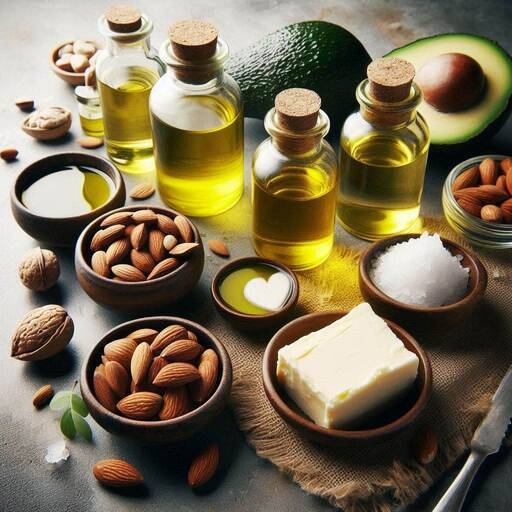
Healthy fats are the cornerstone of the keto diet. Here are some of the best sources:
Avocado Oil: Great for cooking due to its high smoke point.
Olive Oil: Perfect for salads and low-heat cooking.
Coconut Oil: Rich in medium-chain triglycerides (MCTs) that support ketosis.
Butter and Ghee: Ideal for cooking and adding flavor to dishes.
Nuts and Seeds: Almonds, chia seeds, and flaxseeds are excellent sources of healthy fats.
2. Low-Carb Vegetables
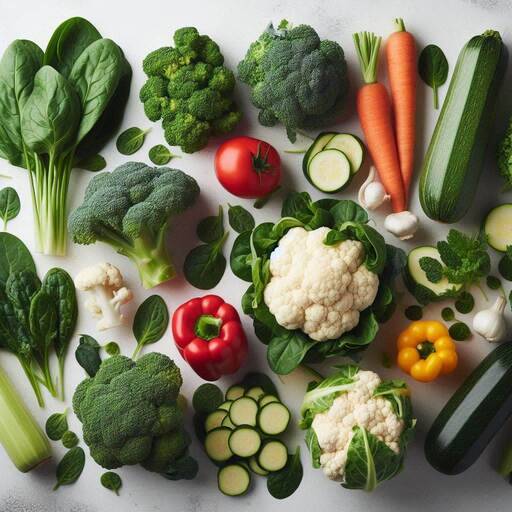
Vegetables are an essential part of the best keto diet food list as they provide fiber, vitamins, and minerals with minimal carbs:
Leafy Greens: Spinach, kale, and arugula are low in carbs and high in nutrients.
Cruciferous Vegetables: Broccoli, cauliflower, and Brussels sprouts are great for keto-friendly dishes.
Zucchini: A versatile vegetable that can be used in place of pasta or as a side dish.
Bell Peppers: Low in carbs and rich in vitamins, making them a tasty addition to any meal.
Mushrooms: Low in carbs and add a meaty texture to dishes.
3. Protein Sources
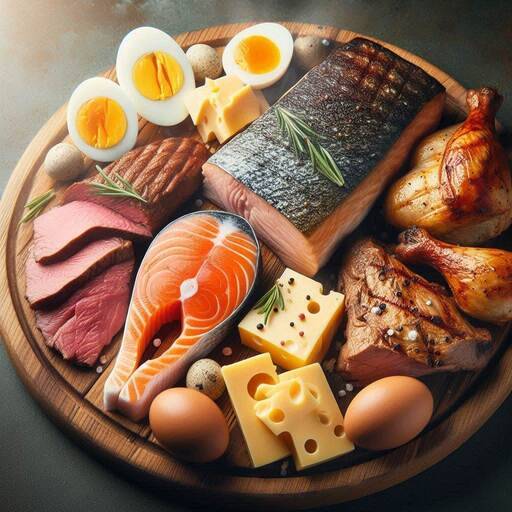
While the keto diet is high in fat, it also includes moderate amounts of protein. Here are some top protein options:
Fatty Fish: Salmon, mackerel, and sardines are rich in omega-3 fatty acids and perfect for the keto diet.
Meat: Grass-fed beef, pork, and lamb provide essential nutrients and are keto-friendly.
Poultry: Chicken thighs and turkey are great for adding variety to your meals.
Eggs: A versatile protein source that can be used in various keto recipes.
Cheese: Hard cheeses like cheddar and parmesan are low in carbs and high in fat.
Think you know the keto diet? Test your knowledge with our interactive quiz! 🧠💪 Find out how much you really know. Take the quiz now.
4. Dairy Products
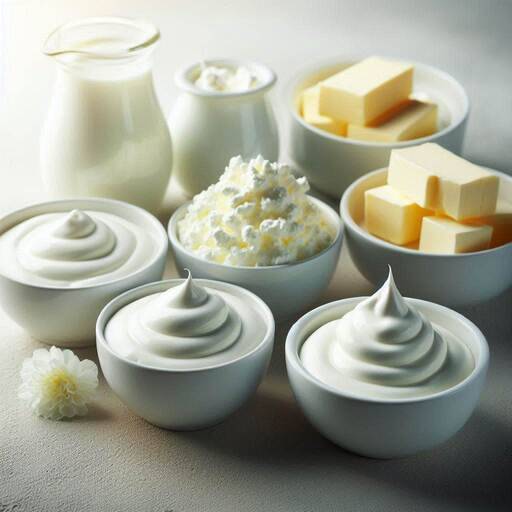
Dairy products are another key component of the best keto diet food list, providing both fat and protein:
Heavy Cream: Use it in coffee or keto-friendly desserts.
Full-Fat Yogurt: Choose unsweetened versions to avoid extra carbs.
Cream Cheese: A delicious addition to snacks and meals.
Sour Cream: Perfect for adding richness to your dishes.
Butter: A staple in keto cooking, ideal for sautéing and baking.
5. Nuts and Seeds
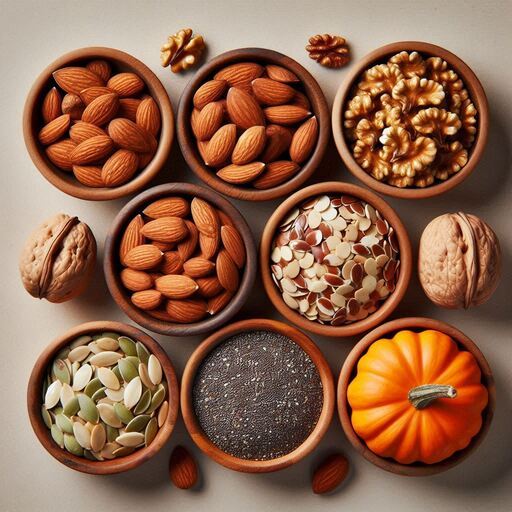
Nuts and seeds are excellent snacks that are high in healthy fats and low in carbs:
Almonds: A great source of vitamin E and magnesium.
Walnuts: Rich in omega-3 fatty acids, perfect for keto.
Chia Seeds: High in fiber and can be used in puddings and smoothies.
Flaxseeds: Excellent for adding to keto-friendly bread and baked goods.
Pumpkin Seeds: A crunchy snack with healthy fats and protein.
6. Berries
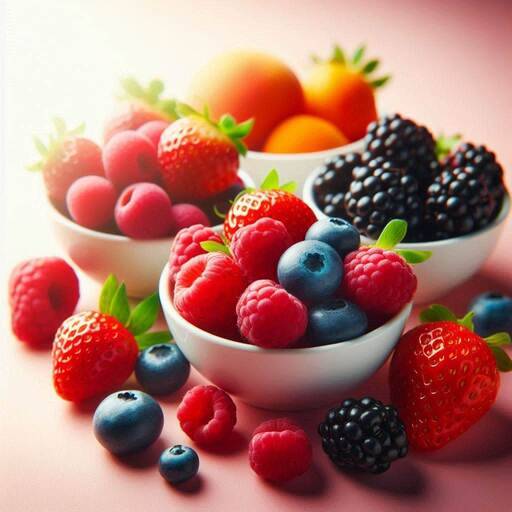
While most fruits are high in sugar and carbs, some berries can fit into a keto diet:
Strawberries: Low in carbs and can be enjoyed in moderation.
Raspberries: High in fiber and low in sugar.
Blackberries: Another low-carb berry option for keto dieters.
Blueberries: Best consumed in small quantities due to their higher carb content.
7. Beverages

Staying hydrated is crucial, and there are several keto-friendly drink options:
Water: The best choice for staying hydrated.
Herbal Teas: Unsweetened teas like green tea or chamomile are keto-friendly.
Coffee: Black coffee or with added heavy cream is ideal for the keto diet.
Bone Broth: Provides electrolytes and is perfect for those on a keto diet.
Sparkling Water: Choose unsweetened versions for a refreshing drink.
8. Snacks
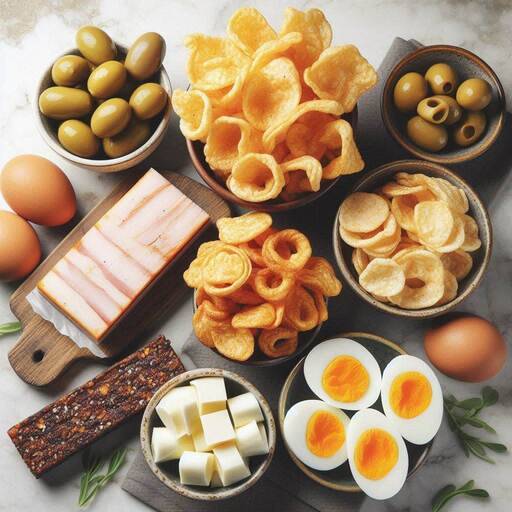
The keto diet doesn’t mean you have to give up snacking. Here are some keto-friendly snacks:
Pork Rinds: A crunchy, low-carb snack.
Cheese Crisps: Made from baked cheese, these are a perfect keto snack.
Hard-Boiled Eggs: Simple and nutritious.
Olives: High in healthy fats and low in carbs.
Keto Bars: Low-carb bars specifically made for keto dieters.
Tips for Following the Best Keto Diet Food List
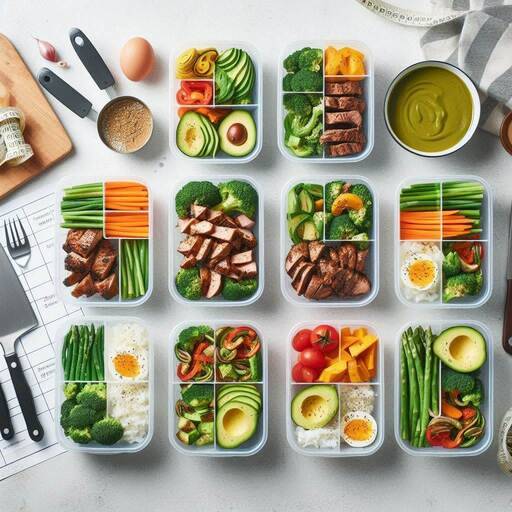
To make the most out of the best keto diet food list, here are some tips:
Meal Prep: Plan and prepare your meals in advance to stay on track.
Read Labels: Always check for hidden carbs and sugars in packaged foods.
Stay Hydrated: Drink plenty of water to support your body during ketosis.
Monitor Macros: Keep track of your fat, protein, and carb intake to ensure you stay within your keto goals.
Think you know the keto diet? Test your knowledge with our interactive quiz! 🧠💪 Find out how much you really know. Take the quiz now.
Conclusion
The best keto diet food list is packed with delicious and nutritious options that will help you succeed on your keto journey. By focusing on healthy fats, low-carb vegetables, quality proteins, and keto-friendly snacks, you can enjoy a variety of meals while staying in ketosis. Remember to plan your meals, stay hydrated, and always read labels to ensure you're sticking to your keto goals.
The ketogenic diet is not just a fad; it's a lifestyle change that can offer numerous health benefits. With the right foods, you can achieve your desired results and maintain them over time.
2 notes
·
View notes
Text
How Brides Can Get Naturally Glowing Skin Through Diet Alone!

As a bride-to-be, your wedding day is a momentous occasion where you want to look and feel your absolute best. Why would anyone not want to be the star in their own wedding?
While skincare products do play a role, getting that coveted Bridal Diet Chart For Glowing Skin glow starts from the inside—specifically, with what you eat and drink.
Keeping that in mind, we have made this guide on how you can enhance your skin's radiance naturally through a thoughtful diet that includes just the right things and omits what your body hates.
Understanding Skin Health
Healthy skin isn't just about appearance; it reflects overall well-being. Factors like hydration, nutrition, and lifestyle choices significantly impact your skin's vitality, glow, and radiance. By nourishing your body with the right foods, you can support its natural processes and get a clear, glowing complexion. Sounds too good to be true? Well, it isn’t. Years of science and anecdotal evidence have shown us that what you eat is perhaps the most important factor in how you look.
Essential Nutrients for Radiant Skin
Hydration is key. Drinking plenty of water throughout the day helps flush out toxins and keeps your skin hydrated from within. Alongside hydration, antioxidants found in fruits and vegetables protect your skin from oxidative stress. All of these result in a healthy glow that any bride would want to have!
Foods That Promote Skin Health
Incorporate a variety of colourful fruits and vegetables into your meals. Try to make your plate look as vibrant as possible, and no, it’s not just for the aesthetics. These fruits and veggies are rich in vitamins A, C, and E, which are essential for skin repair and rejuvenation. Omega-3 fatty acids from sources like salmon and walnuts help maintain skin elasticity and hydration which also make your skin smooth and supple.
Hydration Tips for Bridal Radiance
Aside from water, herbal teas like chamomile or green tea are excellent choices. They not only hydrate but also provide antioxidants that combat free radicals, keeping your skin looking fresh and radiant. However, don’t count out on water! It’s so important to drink a lot of water every day, at least the amount specified by health authorities all over the world.
The Impact of Diet on Skin Conditions
Avoiding excessive sugar and processed foods can be difficult, but trust us it is well worth it. Sugar can trigger inflammation and breakouts, compromising your skin's clarity. Rather you should go for whole foods and limit refined sugars to maintain a balanced complexion.
Probiotics and Skin Balance
Support your gut health with probiotic-rich foods like yogurt, kefir, and fermented vegetables. Yes, even our desi aanchar works as long as you are not consuming a whole lot of oil with it! A healthy gut microbiome contributes to clear skin by reducing inflammation and enhancing nutrient absorption.
Healthy Fats for Skin Elasticity
Incorporate sources of healthy fats such as avocado, olive oil, and nuts into your diet. These fats nourish your skin cells, improving elasticity and moisture levels for a supple, youthful appearance.
Superfoods for Bridal Beauty
Include some superfoods like spinach, blueberries, and almonds in your meals. These foods are loaded with antioxidants and essential nutrients that help boost collagen production and shield your skin from environmental stressors. Superfoods are really the Superman to protect your skin!
Avoiding Skin Irritants
Be cautious of any food allergies or sensitivities that could potentially affect your skin. Common culprits often include dairy and gluten. Giving up dairy seems impossible? Don’t worry, the dairy alternatives we now have in the market are as good, if not better! Identifying and eliminating these triggers can prevent unexpected breakouts or reactions in the lead-up to your wedding day.
Crafting Your Skincare Diet Plan
When planning your meals, strive for a diverse mix of lean proteins, whole grains, fruits, and vegetables. A well-rounded diet gives your skin all the necessary vitamins and minerals to maintain its natural glow. Consider seeking guidance from a nutritionist for personalised recommendations tailored to your specific needs. For the smoothest experience, just reach out to Healthy2bfit on Instagram!
Exercise and Stress Management
Regular physical activity enhances blood circulation—we all know that. It also gives your skin better oxygen and nutrient delivery. Pairing exercise with stress-relieving practices such as yoga or meditation can effectively mitigate stress-related skin issues and give you that wow skin!
Consistency is Key
Start the incorporation of these dietary adjustments into your daily routine early on. Consistency plays a pivotal role in achieving sustainable results. Remember, your dietary choices do impact your skin's appearance and texture—and they do so significantly! So prioritize wholesome foods that support your journey toward bridal beauty.
Conclusion
By focusing on a diet rich in hydration, antioxidants, and essential nutrients, you can achieve naturally glowing skin for your wedding day and beyond. Embrace these dietary changes as part of your bridal preparation and you will be walking down the aisle with confidence and radiant skin in no time!
2 notes
·
View notes
Text
Organic Beauty: Natural Tips for Radiant Skin and Hair
Organic Beauty: Natural Tips for Radiant Skin and Hair
In a world filled with chemical-laden beauty products, embracing organic beauty can be a refreshing and beneficial alternative. Organic beauty focuses on using natural ingredients to enhance your skin and hair health without the risk of harmful side effects. Here’s a guide to some of the best organic beauty tips for achieving radiant skin and healthy hair.
1. Hydrate with Herbal Teas
Hydration is crucial for maintaining healthy skin. While drinking water is essential, herbal teas like chamomile, green tea, and peppermint provide added benefits. These teas are rich in antioxidants that help fight free radicals, reduce inflammation, and promote a natural glow.
organic beauty tips, herbal teas for skin, antioxidant teas, natural hydration
2. Nourish with Aloe Vera
Aloe vera is a powerhouse of nutrients that can soothe and heal the skin. It’s known for its anti-inflammatory and antimicrobial properties, making it perfect for treating sunburns, acne, and dry skin. Simply apply fresh aloe vera gel directly from the plant to your skin for a natural, hydrating treatment.
aloe vera benefits, natural skin remedies, soothing aloe vera
3. Moisturize with Coconut Oil
Coconut oil is an excellent natural moisturizer for both skin and hair. It’s rich in fatty acids and antioxidants, which help to nourish and protect. Use coconut oil as a daily moisturizer, makeup remover, or deep conditioning treatment for your hair to keep it shiny and healthy.
coconut oil for skin, natural moisturizers, organic hair treatments
4. Exfoliate with Sugar and Honey
Exfoliation is key to removing dead skin cells and promoting cell renewal. A simple and effective organic exfoliant can be made using sugar and honey. The sugar granules help to physically remove dead skin, while honey acts as a natural humectant, drawing moisture into the skin.
natural exfoliants, sugar and honey scrub, organic skincare routine
5. Tone with Green Tea
Green tea is not just a refreshing beverage but also an excellent natural toner. Rich in antioxidants, it helps to reduce inflammation and tighten pores. Brew a cup of green tea, let it cool, and use it as a toner by applying it to your face with a cotton pad.
green tea toner, natural toners, antioxidant skincare
6. Detox with Clay Masks
Clay masks are fantastic for drawing out impurities and detoxifying the skin. Bentonite clay and kaolin clay are popular choices that help to cleanse the skin deeply, control oil, and prevent breakouts. Mix the clay with water or apple cider vinegar and apply it to your face for 10-15 minutes.
clay masks benefits, natural detox masks, organic skincare treatments
7. Condition with Avocado
Avocado is packed with vitamins and healthy fats that can deeply condition your hair. Mash a ripe avocado and apply it as a hair mask, leaving it on for about 30 minutes before rinsing. This treatment will leave your hair soft, shiny, and moisturized.
: avocado hair mask, natural hair conditioners, organic hair care
8. Brighten with Lemon and Honey
For a natural way to brighten your complexion, try a mask made from lemon juice and honey. Lemon juice has natural bleaching properties that can lighten dark spots and even out skin tone, while honey provides moisture and antibacterial benefits. Use this mask once a week for best results.
natural skin brighteners, lemon and honey mask, organic beauty treatments
9. Strengthen Nails with Olive Oil
Brittle nails can be strengthened with the regular use of olive oil. Olive oil penetrates the nail and cuticle to repair damage and provide essential moisture. Soak your nails in warm olive oil for 10-15 minutes a few times a week.
olive oil for nails, natural nail care, organic beauty hacks
10. Refresh with Cucumber
Cucumbers are not only hydrating but also have a cooling effect that can soothe puffy eyes and irritated skin. Place cucumber slices over your eyes to reduce puffiness, or blend cucumber and apply it as a face mask to refresh and hydrate your skin.
cucumber for skin, natural eye treatments, organic beauty tips
Embracing organic beauty can transform your skincare and haircare routines by using natural, safe, and effective ingredients. These tips not only enhance your natural beauty but also ensure that you avoid the harmful chemicals often found in commercial beauty products. Incorporate these organic beauty tips into your daily routine for radiant skin and healthy hair.
organic beauty tips, natural skincare, organic haircare, herbal teas for skin, aloe vera benefits, coconut oil for skin, sugar and honey scrub, green tea toner, clay masks benefits, avocado hair mask, lemon and honey mask, olive oil for nails, cucumber for skin
Click here : Oragic beauty
Organic Beauty: Natural Tips for Radiant Skin and Hair
In a world filled with chemical-laden beauty products, embracing organic beauty can be a refreshing and beneficial alternative. Organic beauty focuses on using natural ingredients to enhance your skin and hair health without the risk of harmful side effects. Here’s a guide to some of the best organic beauty tips for achieving radiant skin and healthy hair.
1. Hydrate with Herbal Teas
Hydration is crucial for maintaining healthy skin. While drinking water is essential, herbal teas like chamomile, green tea, and peppermint provide added benefits. These teas are rich in antioxidants that help fight free radicals, reduce inflammation, and promote a natural glow.
organic beauty tips, herbal teas for skin, antioxidant teas, natural hydration
2. Nourish with Aloe Vera
Aloe vera is a powerhouse of nutrients that can soothe and heal the skin. It’s known for its anti-inflammatory and antimicrobial properties, making it perfect for treating sunburns, acne, and dry skin. Simply apply fresh aloe vera gel directly from the plant to your skin for a natural, hydrating treatment.
aloe vera benefits, natural skin remedies, soothing aloe vera
3. Moisturize with Coconut Oil
Coconut oil is an excellent natural moisturizer for both skin and hair. It’s rich in fatty acids and antioxidants, which help to nourish and protect. Use coconut oil as a daily moisturizer, makeup remover, or deep conditioning treatment for your hair to keep it shiny and healthy.
coconut oil for skin, natural moisturizers, organic hair treatments
4. Exfoliate with Sugar and Honey
Exfoliation is key to removing dead skin cells and promoting cell renewal. A simple and effective organic exfoliant can be made using sugar and honey. The sugar granules help to physically remove dead skin, while honey acts as a natural humectant, drawing moisture into the skin.
natural exfoliants, sugar and honey scrub, organic skincare routine
5. Tone with Green Tea
Green tea is not just a refreshing beverage but also an excellent natural toner. Rich in antioxidants, it helps to reduce inflammation and tighten pores. Brew a cup of green tea, let it cool, and use it as a toner by applying it to your face with a cotton pad.
green tea toner, natural toners, antioxidant skincare
6. Detox with Clay Masks
Clay masks are fantastic for drawing out impurities and detoxifying the skin. Bentonite clay and kaolin clay are popular choices that help to cleanse the skin deeply, control oil, and prevent breakouts. Mix the clay with water or apple cider vinegar and apply it to your face for 10-15 minutes.
clay masks benefits, natural detox masks, organic skincare treatments
7. Condition with Avocado
Avocado is packed with vitamins and healthy fats that can deeply condition your hair. Mash a ripe avocado and apply it as a hair mask, leaving it on for about 30 minutes before rinsing. This treatment will leave your hair soft, shiny, and moisturized.
: avocado hair mask, natural hair conditioners, organic hair care
8. Brighten with Lemon and Honey
For a natural way to brighten your complexion, try a mask made from lemon juice and honey. Lemon juice has natural bleaching properties that can lighten dark spots and even out skin tone, while honey provides moisture and antibacterial benefits. Use this mask once a week for best results.
natural skin brighteners, lemon and honey mask, organic beauty treatments
9. Strengthen Nails with Olive Oil
Brittle nails can be strengthened with the regular use of olive oil. Olive oil penetrates the nail and cuticle to repair damage and provide essential moisture. Soak your nails in warm olive oil for 10-15 minutes a few times a week.
olive oil for nails, natural nail care, organic beauty hacks
10. Refresh with Cucumber
Cucumbers are not only hydrating but also have a cooling effect that can soothe puffy eyes and irritated skin. Place cucumber slices over your eyes to reduce puffiness, or blend cucumber and apply it as a face mask to refresh and hydrate your skin.
cucumber for skin, natural eye treatments, organic beauty tips
Embracing organic beauty can transform your skincare and haircare routines by using natural, safe, and effective ingredients. These tips not only enhance your natural beauty but also ensure that you avoid the harmful chemicals often found in commercial beauty products. Incorporate these organic beauty tips into your daily routine for radiant skin and healthy hair.
organic beauty tips, natural skincare, organic haircare, herbal teas for skin, aloe vera benefits, coconut oil for skin, sugar and honey scrub, green tea toner, clay masks benefits, avocado hair mask, lemon and honey mask, olive oil for nails, cucumber for skin
Click here : Oragic beauty
2 notes
·
View notes
Video
youtube
Ways of Enhancing Brain Power
You will come across many people who will talk about various brain enhancing techniques, few of them may tell you about certain medications and supplements to improve memory, especially children and younger adults. As our age progresses, we normally tend to lose our brain power and memory; that is because click here to learn more of numerous factors. However, there are various ways to enhance brain power.
A human brain is a complex structure that is connected with various nerves, gray and white matter, soft tissues, arteries, veins, etc. According to medical experts, normally, our brain-function peaks during childhood or early adulthood and then gradually declines as the age progresses, leading to brain fog and lapses in memory.
But in today’s era, that is not the case, because our modern lifestyle has played an important role in declining our cognitive abilities. Exposures to harmful substances, chemicals, constant stress, poor diet, sleeping disorders, etc. are responsible for cognitive decline. Nevertheless, one can support their brain health by encouraging brain to undergo Neurogenesis process i.e. growing new neurons. Listed are few effective ways of improving brain power:
• Healthy Diet
Whatever you eat is useful not only for your stomach but also for your brain and memory. Unhealthy diet that is rich in sugars, bad fats, etc. by no means is good for your brain. It is essential to eat a well-balanced diet on daily basis to nourish your brain, such as fresh fruits and vegetables, curry, celery, broccoli, walnuts, whole grains and beans. Opt for plant or animal-based foods that are loaded with omega-3 fatty acids. Coconut and olive oil are found useful in enhancing brain functions.
• Regular Exercise
Regular physical activities promotes your brain functions by activating neurogenesis process i.e. multiplication of new nerve cells. At the same time, exercise interconnects nerve cells and protects them from damage. Neurogenesis takes place when blood flow to the brain is augmented; thereby, expanding the nervous system’s memory center. One can perform aerobic exercises (walking, cycling, swimming, etc.), strength training, stretching, and high-intensity workout with short intervals, core works, Yoga and meditation.
• Get Adequate Sleep
Sleep deprivation and excessive sleep both are dangerous not only for your physical health but also mental health. Sleeping disorders can greatly hamper the brain function, as it is under immense stress, creating problems in Neurogenesis process. Therefore, one needs to get adequate amount of sleep to allow brain to function properly. Experts suggest eight to nine hours of sleep everyday for optimal mental health functions.
• Play Brain Games
To enhance your brain power and improve memory, you need to challenge your brain with new activities and information; if you don’t do that, you are actually deteriorating your brain functions. One of the ways to challenge your brain is by participating in “Brain Games”, like playing online games or games in which your mental abilities are involved; you can also play any sport. You can play for 20 minutes or so; do not exceed the time limit, and try to play different games. Do not stick to only one task, as it will not expand your abilities.
• Quit Multitasking
If you are a multi-tasker, try to stay away from it, because it may slow down your potential; make you vulnerable to commit mistakes, and can make you absent-minded. Hence, try to concentrate on one task at a time, work on it, complete it, and then switch on to other task. You can take a short break of about 10 to 15 minutes between two tasks.
• Perform New Skill
Indulging yourself in a meaningful and purposeful activity will stimulate your brain functions, manage stress and reduce the risk of developing dementia (memory loss). Try to perform those tasks that can hold your full attention, and try to accomplish it. Try different skills like gardening, crafting, drawing, playing musical instruments, and many more.
2 notes
·
View notes
Text
The Nutritional Value of Food in Our Daily Life and Its Impact
Food is not just a source of energy; it is the foundation of our health, well-being, and overall quality of life. The nutritional value of the food we consume daily has a profound impact on our physical health, mental well-being, and longevity. In this article, we will delve into the importance of nutrition, the components of a balanced diet, and the far-reaching effects of proper nutrition on our daily lives.
The Importance of Nutrition
Nutrition is the science that interprets the interaction of nutrients and other substances in food in relation to maintenance, growth, reproduction, health, and disease of an organism. A balanced diet provides essential nutrients that the body needs to function effectively. These nutrients include macronutrients (carbohydrates, proteins, and fats) and micronutrients (vitamins and minerals).
Macronutrients
Carbohydrates: Carbohydrates are the body's main source of energy. They are found in foods such as bread, rice, pasta, fruits, and vegetables. Carbohydrates are converted into glucose, which is used by the body for energy. Complex carbohydrates, found in whole grains and legumes, provide sustained energy and are essential for overall health.
Proteins: Proteins are the building blocks of the body. They are crucial for the growth and repair of tissues, and they play a vital role in the production of enzymes, hormones, and other body chemicals. Sources of protein include meat, fish, eggs, dairy products, legumes, and nuts.
Fats: Fats are essential for brain health, energy, and the absorption of certain vitamins. Healthy fats, such as those found in avocados, nuts, seeds, and olive oil, support cell growth and protect organs. It's important to limit the intake of saturated and trans fats, which are found in processed foods and can lead to health issues.
Micronutrients
Vitamins: Vitamins are organic compounds that are crucial for various metabolic processes. For example, Vitamin C supports the immune system, Vitamin D is important for bone health, and B vitamins are involved in energy production and brain function. Vitamins are found in a variety of foods, including fruits, vegetables, and animal products.
Minerals: Minerals such as calcium, potassium, and iron are inorganic elements that support many bodily functions. Calcium is vital for bone health, potassium helps regulate fluid balance, and iron is essential for oxygen transport in the blood. These minerals are found in dairy products, fruits, vegetables, meat, and whole grains.
The Impact of Nutrition on Health
Proper nutrition has a wide range of positive effects on health and well-being. Here are some key areas where nutrition plays a crucial role:
Physical Health
Weight Management: A balanced diet helps maintain a healthy weight. Consuming the right amount of calories and nutrients prevents obesity and related health issues such as diabetes, cardiovascular diseases, and joint problems. Foods high in fiber, such as fruits, vegetables, and whole grains, help control appetite and promote weight loss.
Disease Prevention: A diet rich in fruits, vegetables, whole grains, and lean proteins can reduce the risk of chronic diseases. Antioxidants found in fruits and vegetables protect cells from damage, reducing the risk of cancer and heart disease. Omega-3 fatty acids found in fish have anti-inflammatory properties and are beneficial for heart health.
Bone Health: Adequate intake of calcium and Vitamin D is essential for maintaining strong bones and preventing osteoporosis. Dairy products, leafy greens, and fortified foods are good sources of these nutrients.
Immune Function: Nutrients such as Vitamins A, C, and E, as well as zinc and selenium, are vital for a healthy immune system. These nutrients help the body fight infections and reduce the severity of illnesses.
Mental Health
Brain Function: Nutrients play a critical role in brain health and cognitive function. Omega-3 fatty acids, found in fish and flaxseeds, support brain development and function. B vitamins and antioxidants protect the brain from oxidative stress and improve memory and concentration.
Mood Regulation: Diet can affect mood and mental well-being. Serotonin, a neurotransmitter that regulates mood, is influenced by diet. Foods rich in tryptophan, such as turkey, eggs, and cheese, can boost serotonin levels and improve mood. Additionally, a diet high in refined sugars and processed foods can lead to mood swings and increase the risk of depression.
Stress and Anxiety: Certain foods can help manage stress and anxiety. Complex carbohydrates, such as whole grains, increase the production of serotonin, which has a calming effect. Foods rich in magnesium, like spinach and nuts, help relax muscles and reduce anxiety.
Practical Tips for a Balanced Diet
Achieving a balanced diet is not about strict limitations or depriving yourself of foods you love. Rather, it's about feeling great, having more energy, and improving your health. Here are some practical tips to help you get started:
Eat a Variety of Foods: Incorporate a wide range of fruits, vegetables, whole grains, lean proteins, and healthy fats into your diet. This ensures you get a broad spectrum of nutrients.
Portion Control: Be mindful of portion sizes to avoid overeating. Using smaller plates and bowls can help control portion sizes.
Stay Hydrated: Drinking plenty of water is crucial for overall health. It helps regulate body temperature, keeps joints lubricated, and aids in digestion.
Limit Processed Foods: Reduce the intake of processed and sugary foods. These foods are often high in unhealthy fats, sugars, and sodium, which can lead to health issues.
Plan Meals: Planning meals in advance can help ensure you eat a balanced diet. Preparing meals at home allows you to control ingredients and portion sizes.
Listen to Your Body: Pay attention to hunger and fullness cues. Eat when you're hungry and stop when you're satisfied.
Conclusion
The nutritional value of the food we consume daily has a profound impact on our health and well-being. A balanced diet rich in essential nutrients supports physical health, enhances mental well-being, and prevents chronic diseases. By making informed food choices and incorporating a variety of nutrient-dense foods into our diets, we can improve our quality of life and achieve optimal health. Remember, good nutrition is not about deprivation but about making sustainable and enjoyable choices that nourish the body and mind.
2 notes
·
View notes
Text

Grilled Mackerel With Lemon-Dill Yogurt Sauce
Ingredients:
* 2 mackerel fillets
* 1 tablespoon olive oil
* Salt and pepper to taste
* 1/2 cup Greek yogurt
* 1 clove garlic, minced
* 1 tablespoon lemon zest
* 1 tablespoon chopped dill
* Salt and pepper to taste
* 1/4 red onion, thinly sliced
* 1/2 cucumber, thinly sliced
* Handful of mixed greens
* 1 tablespoon olive oil
* 1/2 lemon, juiced
* Salt and pepper to taste
Instructions:
* Drizzle mackerel fillets with olive oil, salt, and pepper.
* Grill or pan-sear until cooked through.
* Combine Greek yogurt, minced garlic, lemon zest, and chopped dill in a bowl.
* Season with salt and pepper to taste.
* Thinly slice red onion and cucumber.
* In a large bowl, combine mixed greens, red onion, and cucumber.
* Drizzle with olive oil and lemon juice.
* Season with salt and pepper.
* Place a bed of salad on a plate.
* Top with a grilled mackerel fillet.
* Dollop with lemon-dill yogurt sauce.
Nutritional Benefits:
* Mackerel: Provides a rich source of omega-3 fatty acids, protein, and essential vitamins and minerals.
* Yogurt: Offers protein, calcium, and probiotics for gut health.
* Lemon: Contains vitamin C, an antioxidant.
* Dill: Provides antioxidants and anti-inflammatory properties.
* Vegetables: Offer vitamins, minerals, and fiber.
This dish is a flavorful and nutritious way to enjoy the benefits of mackerel. The combination of grilled fish, creamy yogurt sauce, and fresh vegetables creates a well-balanced meal.
#food#food photography#foodpics#foodie#foodmyheart#foodlover#tw food#healthy food#food fight#comfort food#fast food#food for thought#lunch recipes#pasta recipes#pasta recipe#salad recipes#soup recipe#recipe#reciprocidade#reciprocity#recipies#recipes#cozy autumn#cozy fall#cozy art#cozy cozy#healhtylifestyle#healthy salad recipes#healthy lunch ideas#healthy lunch
37 notes
·
View notes
Text
How do I gain weight so fast in 2024
We'll look at practical methods in this post to help you put on weight organically and rapidly in 2024. Since every person's body is different, these suggestions center on safe, healthy weight-gain techniques that you can implement into your daily routine.
Key Takeaways:
Gaining weight quickly and naturally is possible with the right strategies.
Our focus is on healthy weight gain methods that prioritize overall well-being.
These tips can be safely incorporated into your lifestyle.
Emphasizing balanced nutrition, calorie intake, exercise, and meal planning are key.
Supplements and targeted exercises can complement your weight gain journey.
Understanding Healthy Weight Gain
Before diving into specific strategies, it's important to understand the principles of healthy weight gain. By focusing on balanced nutrition, adequate calorie intake, and regular exercise, you can achieve weight gain in a way that promotes overall well-being.
To reach a healthy weight gain, it's crucial to prioritize a well-rounded approach that nourishes your body with the right nutrients. This means incorporating a variety of foods from all food groups, including lean proteins, whole grains, fruits, vegetables, and healthy fats.
Effective weight gain strategies are centered around consuming more calories than your body burns. However, it's important to choose nutrient-dense foods that provide essential vitamins and minerals. Aim to increase your calorie intake by adding healthy, high-calorie foods to your meals and snacks.
Regular exercise is also key in gaining weight in a healthy way. Engaging in strength training exercises can help build lean muscle mass, contributing to a healthy weight gain. Additionally, exercise promotes overall fitness and enhances appetite, allowing you to consume the necessary calories for weight gain.
Remember, healthy weight gain is a gradual process. It's important to approach it with patience and consistency, allowing your body to adapt and progress steadily towards your goal.
Planning Your Diet for Weight Gain
Gaining weight quickly requires a well-planned diet that incorporates nutrient-rich foods and strategic meal planning. By focusing on the right combination of macronutrients and incorporating calorie-dense options, you can optimize your weight gain journey. Here are some essential nutritional tips and the best foods for gaining weight.
Essential Nutrients for Weight Gain
When planning your diet for weight gain, it's important to ensure you're consuming the right balance of nutrients. Proteins, carbohydrates, and healthy fats play a crucial role in promoting muscle growth and providing the energy needed for gaining weight fast. Include these macronutrients in your diet:
Proteins: Opt for lean sources like chicken breast, turkey, fish, tofu, and Greek yogurt. These protein sources are not only high in quality but also provide essential amino acids for muscle repair and growth.
Carbohydrates: Choose complex carbs like whole grains, potatoes, quinoa, and sweet potatoes. These provide sustained energy for workouts and fuel for weight gain.
Healthy Fats: Incorporate sources like avocados, nuts, seeds, olive oil, and fatty fish like salmon into your diet. Healthy fats provide additional calories and support various bodily functions.
Calorie-Dense Foods to Include
To gain weight quickly, it's important to consume calorie-dense foods that provide a significant amount of energy in smaller portions. Consider adding these foods to your diet:
Nut Butters: Peanut butter, almond butter, and other nut butters are calorie-dense and packed with healthy fats.
Dried Fruits: Raisins, dates, and dried apricots are high in calories and can be easily incorporated into snacks or added to oatmeal and salads.
Whole Milk: Whole milk is a great source of healthy fats and protein. It can be consumed alone or added to smoothies and shakes to increase calorie intake.
Cheese: Cheese is not only rich in calories but also provides additional protein. Add it to sandwiches, salads, or enjoy it as a snack.
Granola: Granola is a calorie-dense option that can be added to yogurt, cereal, or enjoyed as a standalone snack.
Meal Planning Techniques for Optimal Weight Gain
Effective meal planning is key to gaining weight fast and efficiently. Consider the following techniques to ensure your meals support your weight gain goals:
Frequency: Aim for 4-6 smaller meals throughout the day rather than sticking to 3 larger meals. This approach helps ensure a consistent calorie intake.
Snacks: Incorporate snacks between meals to increase overall calorie intake. Choose calorie-dense options like protein bars, trail mix, or Greek yogurt with fruits and nuts.
Preparation: Preparing your meals and snacks in advance can help you stay on track with your weight gain goals. Consider meal prepping on weekends and portioning out your meals for the week.
Protein Timing: Distribute your protein intake evenly throughout the day to support muscle growth and repair. Include protein-rich foods or supplements in each meal.
By following these nutritional tips, incorporating calorie-dense foods, and implementing effective meal planning techniques, you can optimize your diet for fast weight gain. Remember to consult a healthcare professional or registered dietitian for personalized recommendations.
Supplementing for Weight Gain
When it comes to gaining weight, a well-rounded nutrition plan is essential. In addition to a healthy diet, incorporating the right supplements can help accelerate your weight gain journey. In this section, we will explore the best weight gain supplements in the market that can complement your diet and support your goals.
Protein Powders: Protein is a key nutrient for building muscle mass and promoting weight gain. Supplementing with protein powders can provide a convenient and efficient way to increase your daily protein intake. Look for high-quality protein powders that are rich in essential amino acids to enhance muscle growth and support weight gain.
Weight Gainers: Weight gainer supplements are specifically designed to provide a concentrated source of calories and nutrients. These products typically contain a blend of carbohydrates, proteins, and fats to help you meet your calorie goals. Choose weight gainers that are tailored to your specific needs and preferences.
Omega-3 Fatty Acids: Omega-3 fatty acids are not only beneficial for overall health but can also support weight gain. These healthy fats can help increase appetite, reduce inflammation, and improve nutrient absorption. Incorporate omega-3 supplements, such as fish oil or algae-based supplements, into your daily routine to optimize your weight gain efforts.
Testimonials
"I started using weight gainer supplements as part of my weight gain journey, and the results have been fantastic. It has made it so much easier for me to meet my calorie goals and gain weight effectively. Highly recommended!" - Sarah, fitness enthusiast
Vitamin and Mineral Supplements: Adequate vitamin and mineral intake is crucial for overall health and well-being. When it comes to weight gain, certain vitamins and minerals play a vital role in supporting the body's metabolic functions. Consider supplements that provide essential nutrients like vitamin D, vitamin B complex, magnesium, and zinc to ensure optimal health during your weight gain journey.
Before incorporating any supplements into your routine, it is important to consult with a healthcare professional or a registered dietitian. They can provide personalized recommendations based on your specific needs and help you determine the appropriate dosage for each supplement.
Supplement
Benefits
Protein powders
• Promotes muscle growth • Convenient source of high-quality protein
Weight gainers
• Provides concentrated calories • Supports weight gain goals
Omega-3 fatty acids
• Increases appetite • Reduces inflammation • Enhances nutrient absorption
Vitamin and mineral supplements
• Supports overall health • Ensures adequate nutrient intake
By incorporating these carefully chosen supplements into your weight gain journey, you can optimize your nutrition intake and support your overall goals. Remember, supplements should always be used in conjunction with a balanced diet and regular exercise for the best results.
Incorporating Exercise for Muscle Gain
When it comes to gaining weight quickly and effectively, exercise plays a crucial role in accelerating the weight gain process. While proper nutrition is essential, incorporating a well-rounded workout routine can help you build lean muscle mass and increase your body weight.
Effective Workout Routines
There are various workout routines that can speed up weight gain and promote muscle growth. High-intensity interval training (HIIT) is an excellent option as it combines short bursts of intense exercise with brief recovery periods, effectively stimulating muscle development and calorie burning.
Strength training exercises are also highly beneficial for gaining weight rapidly. By engaging in compound exercises such as squats, deadlifts, bench presses, and shoulder presses, you can target multiple muscle groups simultaneously, promoting overall muscle growth and weight gain.
Tips for Gaining Weight Rapidly
Progressive Overload: To maximize muscle gain, gradually increase the intensity of your workouts by adding weight, increasing repetitions, or decreasing rest periods. This progressive overload technique helps to continuously challenge your muscles and stimulate growth.
Focus on Major Muscle Groups: Targeting major muscle groups like the chest, back, legs, and shoulders during your workouts can lead to faster weight gain. These larger muscle groups require more energy and effort, resulting in greater muscle stimulation and growth.
Proper Form and Technique: Ensure that you use proper form and technique during your exercises to avoid injuries and effectively target the intended muscle groups. If needed, seek guidance from a certified fitness professional.
Rest and Recovery: Allow your body adequate time to rest and recover between workouts. Overtraining can hinder muscle growth and lead to fatigue. Aim for at least 48 hours of recovery between sessions targeting the same muscle group.
By incorporating these tips into your workout routine, you can achieve visible muscle gain and accelerate your weight gain journey. Remember to listen to your body and make adjustments as needed to suit your individual needs and goals.
Exercise
Description
Repetitions
Sets
Bench Press
Lie on a bench and lower the weight to your chest, then push it back up
8-12
3-4
Squat
With a barbell on your shoulders, lower into a squat position and stand back up
8-12
3-4
Deadlift
With a barbell on the ground, lift it up using your legs and lower back
8-12
3-4
Shoulder Press
With dumbbells in your hands, raise them above your head and lower them back down
8-12
3-4
Balancing Caloric Intake and Expenditure
When it comes to fast weight gain, finding the right balance between caloric intake and expenditure is crucial. In order to achieve your weight gain goals, it's important to understand how to calculate your daily energy needs and make the most of your calorie intake. We're here to provide you with effective tips and tricks for quick weight gain that will help you reach your desired results.
Calculating Your Daily Energy Needs
Before you can effectively balance your caloric intake and expenditure, it's essential to determine how many calories your body needs each day. There are various formulas you can use to calculate this, such as the Harris-Benedict equation or the Mifflin-St. Jeor equation. These equations take into account factors like your age, gender, weight, height, and activity level.
"Understanding your daily energy needs is the first step towards achieving rapid weight gain."
By calculating your daily energy needs, you'll have a baseline number of calories to aim for in order to gain weight. However, keep in mind that this number is just an estimate and may need to be adjusted over time based on your progress and individual metabolism. It's always a good idea to consult with a healthcare professional or registered dietitian for personalized guidance.
Maximizing Calorie Intake for Weight Gain
Once you've determined your daily energy needs, you can focus on maximizing your calorie intake to promote fast weight gain. Here are some effective methods:
Eat nutrient-dense foods: Choose calorie-dense foods that are also rich in nutrients. This includes foods like nuts, avocados, nut butter, olive oil, whole grains, and lean protein sources.
Incorporate snacks: Snacking throughout the day can help increase your calorie intake. Opt for high-calorie snacks like trail mix, protein bars, yogurt with granola, or smoothies.
Drink calorie-rich beverages: Replace low-calorie drinks with calorie-rich options like milk, smoothies, fruit juices, or meal replacement shakes.
Tips for Quick Weight Gain
In addition to maximizing your calorie intake, there are other tips and tricks you can implement to accelerate your weight gain journey:
Eat more frequently: Instead of sticking to three big meals, try eating smaller, more frequent meals throughout the day to increase your overall calorie consumption.
Focus on strength training: Incorporate regular strength training exercises into your fitness routine. Building muscle mass can help you gain weight more rapidly and increase your overall body weight.
Stay consistent: Consistency is key when it comes to gaining weight quickly. Stick to your nutrition and exercise plan, and don't be discouraged by any temporary plateaus or setbacks.
By applying these fast weight gain tips and tricks, you'll be on your way to achieving your weight gain goals in no time. Remember to listen to your body, prioritize your overall health, and consult with professionals for personalized guidance. Let's work together to make your weight gain journey a success!
Tips for Fast Weight Gain
Description
Eat nutrient-dense foods
Choose foods that are high in calories and provide essential nutrients, such as nuts, avocados, and lean protein sources.
Incorporate snacks
Add high-calorie snacks to your daily routine, such as trail mix, protein bars, yogurt with granola, or smoothies.
Drink calorie-rich beverages
Replace low-calorie drinks with calorie-rich options like milk, smoothies, fruit juices, or meal replacement shakes.
Eat more frequently
Opt for smaller, more frequent meals throughout the day to increase overall calorie consumption.
Focus on strength training
Incorporate regular strength training exercises into your fitness routine to build muscle mass and promote weight gain.
Stay consistent
Stick to your nutrition and exercise plan, and don't be discouraged by temporary plateaus or setbacks.
Optimizing Meal Frequency and Timing
When it comes to gaining weight rapidly and naturally, the timing and frequency of your meals play a crucial role. By optimizing these factors, you can maximize nutrient absorption and promote quick ways to increase body weight.
The Importance of Spacing Out Meals
Spacing out your meals evenly throughout the day can help ensure a steady flow of nutrients to support weight gain. Instead of consuming three large meals, consider dividing your calorie intake into smaller, more frequent meals. This approach allows your body to efficiently utilize the nutrients, providing the necessary fuel to gain weight quickly and naturally.
Incorporating Snacks for Enhanced Caloric Intake
In addition to regular meals, incorporating snacks between your main meals can further boost your caloric intake. Opt for nutrient-dense snacks that are rich in healthy fats, protein, and carbohydrates. Snacking on foods such as nuts, nut butter, yogurt, granola bars, or fruit can provide the extra calories needed to gain weight rapidly.
Optimizing Nutrient Absorption
To optimize nutrient absorption and promote fast and natural weight gain, pay attention to the timing of your meals. Aim to consume protein-rich foods before or after a workout session to support muscle growth and repair. Additionally, including complex carbohydrates before physical activity can provide your body with the energy it needs to perform at its best.
Remember, gaining weight quickly and naturally requires a strategic approach to meal frequency and timing. By spacing out your meals, incorporating snacks, and optimizing nutrient absorption, you can effectively increase body weight in a healthy, sustainable manner.
Overcoming Challenges and Plateaus
Gaining weight rapidly may come with its fair share of challenges and plateaus. It's important to be aware of these obstacles and have strategies in place to overcome them. By staying focused and making adjustments along the way, you can ensure consistent progress towards achieving fast and healthy weight gain. Here are some tips for gaining weight quickly:
1. Monitor Your Caloric Intake
Tracking your calorie intake is essential for achieving fast weight gain. Aim to consume more calories than your body needs to maintain its current weight. Include calorie-dense foods in your diet such as nuts, avocados, and full-fat dairy products to increase your overall calorie intake.
2. Adjust Your Macronutrient Ratio
Your macronutrient ratio plays a crucial role in weight gain. Increase your intake of healthy fats, proteins, and carbohydrates to fuel your body and support muscle growth. Opt for lean sources of protein like poultry, fish, and legumes, and incorporate whole grains and complex carbohydrates into your meals.
3. Stay Consistent with Meal Timing
Eating regular meals and snacks throughout the day can help you maintain a positive calorie balance and prevent energy dips. Aim to have meals and snacks every 2 to 3 hours to keep your metabolism active and support efficient weight gain.
4. Incorporate Strength Training
To gain weight quickly and build muscle mass, include regular strength training exercises in your fitness routine. Focus on compound exercises that target multiple muscle groups, and gradually increase the weight and intensity of your workouts over time.
5. Stay Motivated and Mindful
Gaining weight quickly can be a challenging journey, both physically and mentally. Surround yourself with a supportive network of friends and family who understand your goals. Practice self-care and mindfulness techniques to manage stress and stay motivated throughout the process.
6. Consult with a Professional
If you're facing difficulties or struggling to achieve your weight gain goals, consider seeking guidance from a registered dietitian or other healthcare professional. They can provide personalized advice and tailored strategies to help you overcome plateaus and make progress towards your goal.
Challenges
Tips to Overcome
Loss of appetite
- Try consuming smaller, frequent meals - Experiment with new flavors and recipes - Incorporate your favorite foods
Slow metabolism
- Stay active throughout the day - Engage in regular exercise - Consider incorporating high-intensity interval training (HIIT)
Difficulty in gaining muscle mass
- Make sure you're consuming enough protein - Focus on compound exercises - Gradually increase weights and intensity
Mental and emotional barriers
- Seek support from loved ones - Practice mindfulness and stress management techniques - Set realistic goals and celebrate progress
Remember, achieving fast weight gain and maintaining a healthy lifestyle is a journey that requires dedication and patience. By implementing these tips and staying committed to your goals, you can overcome challenges and plateaus, and achieve the weight gain results you desire.
Emotional and Mental Well-being during Weight Gain
The journey of gaining weight is not just physical; it also takes a toll on our emotional and mental well-being. It's essential to prioritize our mental health during this process. Here are some strategies to maintain a positive mindset, overcome body image concerns, and manage stress during your weight gain journey:
Celebrate small victories: Acknowledge and celebrate every milestone, no matter how small. Whether it's gaining a few pounds or noticing increased strength, recognize your progress and give yourself credit for your efforts.
Practice self-compassion: Be kind to yourself throughout the journey. Remember that gaining weight takes time and patience. Treat yourself with the same compassion and understanding you would offer to a friend.
Surround yourself with support: Surround yourself with a supportive network of friends, family, or a support group who understand your goals and can provide encouragement. Having a strong support system can make a significant difference in your motivation and mental well-being.
Foster positive body image: Focus on the amazing things your body can do rather than solely on its appearance. Appreciate the strength and vitality you gain through your weight gain journey, and practice gratitude for your body's capabilities.
Manage stress: Stress can negatively impact your weight gain journey. Find healthy ways to manage stress, such as exercise, meditation, or engaging in activities you enjoy. Taking care of your mental health will contribute to your overall well-being during this process.
Remember, gaining weight is about improving your overall health and well-being, and it's essential to be patient and kind to yourself throughout the journey.
Strategy
Benefits
Celebrate small victories
Keeps you motivated and boosts confidence
Practice self-compassion
Increases self-esteem and reduces stress
Surround yourself with support
Provides encouragement and accountability
Foster positive body image
Enhances self-acceptance and improves mental well-being
Manage stress
Reduces the negative impact of stress on your journey
Long-Term Weight Maintenance
Once you have successfully gained weight using effective and quick weight gain methods, it's important to focus on long-term weight maintenance. This phase of your journey is crucial for achieving your desired body weight and ensuring that your efforts are sustainable in the long run.
When it comes to maintaining your new weight, consistency is key. Stick to the healthy weight gain tips that have worked for you and continue following a balanced diet and exercise routine. Remember, gaining weight effectively is not a one-time event, but a lifestyle change.
Avoid falling into the trap of rapid weight loss. Your body needs time to adjust to its new weight and sustain it over time. Quick weight gain methods may have resulted in significant changes, but losing weight too quickly can be detrimental to your overall health and well-being.
Supporting healthy body composition is another important aspect of long-term weight maintenance. Focus on building and maintaining lean muscle mass through regular exercise and strength training. This will help ensure that your weight gain is healthy and sustainable, improving your overall body composition.
3 Tips for Long-Term Weight Maintenance
Consistency is key: Stick to your healthy weight gain routine, including a balanced diet and regular exercise, to maintain your new weight effectively.
Avoid rapid weight loss: Give your body time to adjust to its new weight and avoid losing weight too quickly after achieving your weight gain goals.
Focus on body composition: Continue building and maintaining lean muscle mass through strength training exercises to support a healthy body composition.
By following these tips and prioritizing your long-term weight maintenance, you can ensure that your efforts to gain weight effectively and quickly are sustainable in the years to come. Remember, maintaining a healthy lifestyle is a lifelong commitment and an investment in your overall well-being.
Key Points
Benefits
Consistency
Ensures that your weight gain efforts are sustainable in the long run.
Avoiding rapid weight loss
Promotes overall health and prevents negative impacts on your well-being.
Focus on body composition
Improves your overall body composition and supports a healthy weight.
Conclusion
We have given you practical tips to help you gain weight fast and naturally in 2024 throughout this extensive book. You can prioritize your general health and well-being while reaching your weight gain goals by including these suggestions into your daily routine. Recall that in your weight gain journey, patience and consistency are crucial.
You may make sure that you are giving your body the right amount of calories and nutrients by arranging your meals in accordance with the concepts of healthy weight growth. Exercise and supplements can also help you gain weight more quickly and efficiently by assisting in the development of lean muscle mass.
It's critical to go past obstacles and roadblocks that you may. Remain upbeat and resilient, concentrating more on your advancement than any difficulties. Throughout your weight gain journey, take good care of your emotional and mental health because it will contribute significantly to your total success.
Finally, keep in mind how important it is to maintain your weight increase over time. Take heed of the advice in this guide to sustain your weight gain and steer clear of sudden weight reduction. Make maintaining a healthy body composition your first priority, and keep making decisions that will benefit your general health.
You may also try this
FAQ
How can I gain weight quickly and naturally in 2024?
To gain weight quickly and naturally, focus on a balanced approach that includes a well-planned diet, regular exercise, and adequate calorie intake. Incorporate calorie-dense foods, such as nuts, avocados, and whole grains, into your meals. Additionally, consider incorporating weight gain supplements and strength training exercises to support muscle growth. Remember to consult with a healthcare professional before making any significant changes to your diet or exercise routine.
What are some healthy weight gain methods?
Healthy weight gain involves consuming a well-rounded and nutrient-rich diet. Opt for foods that are high in calories and nutrients, such as lean proteins, whole grains, and healthy fats. Additionally, prioritize regular exercise, especially strength training exercises that promote muscle growth. Aim to gradually increase your calorie intake and focus on overall well-being throughout your weight gain journey.
How can I plan my diet for weight gain?
Planning your diet for weight gain involves incorporating calorie-dense foods, such as nuts, nut butter, lean meats, whole grains, and healthy fats. Ensure you are consuming a balanced mix of macronutrients, including proteins, carbohydrates, and fats. Consider dividing your daily calorie intake into several smaller meals and snacks throughout the day to maximize nutrient absorption and energy levels.
Are there any supplements that can help with weight gain?
Yes, certain weight gain supplements can complement your diet and support your weight gain goals. Look for supplements that contain high-quality protein, creatine, or other ingredients that promote muscle growth. Remember that supplements should be used in conjunction with a nutritious diet and exercise routine, and it's always best to consult a healthcare professional before starting any new supplement regimen.
How can I incorporate exercise for muscle gain?
To gain weight quickly and efficiently, incorporate regular exercise, particularly strength training exercises. Focus on compound exercises that target multiple muscle groups and gradually increase your weights or resistance over time. This can help stimulate muscle growth and contribute to healthy weight gain.
How can I balance caloric intake and expenditure for rapid weight gain?
Balancing caloric intake and expenditure is essential for rapid weight gain. Calculate your daily caloric needs and ensure you are consuming a surplus of calories above your maintenance level. Opt for nutrient-dense, calorie-rich foods and spread out your meals and snacks throughout the day to maximize calorie intake. Remember to track your progress and adjust your caloric intake as needed.
Are there any tips for optimizing meal frequency and timing for weight gain?
To optimize meal frequency and timing for weight gain, aim to consume smaller, nutrient-rich meals and snacks every 2-3 hours. This approach helps keep your energy levels stable and maximizes nutrient absorption. Additionally, consider consuming a balanced meal or snack with protein and carbohydrates shortly after exercise to aid in muscle recovery and growth.
What can I do to overcome challenges and plateaus during weight gain?
Overcoming challenges and plateaus during weight gain requires consistency, patience, and a positive mindset. Set realistic goals and track your progress to stay motivated. Adjust your diet and exercise routine when necessary and seek support from a healthcare professional or a qualified fitness expert. Remember that plateaus are a normal part of any weight gain journey, and with perseverance, you can push through them.
How can I prioritize emotional and mental well-being during weight gain?
Prioritizing emotional and mental well-being during weight gain is essential. Practice self-care, such as engaging in stress-relieving activities, talking to supportive friends or family members, and seeking professional help if needed. Cultivate a positive body image by focusing on your strengths and celebrating your progress. Remember that weight gain should be a journey towards improved health and well-being, rather than an obsession with the number on the scale.
How do I maintain long-term weight gain?
Maintaining long-term weight gain requires staying consistent with healthy habits. Focus on a wholesome, balanced diet that includes a variety of nutrient-rich foods. Keep up with regular exercise, particularly strength training, to maintain muscle mass. Be mindful of your caloric intake and adjust it as needed to support weight maintenance. Finally, prioritize self-care and a healthy mindset to sustain your weight gain journey in the long run.
2 notes
·
View notes
Text
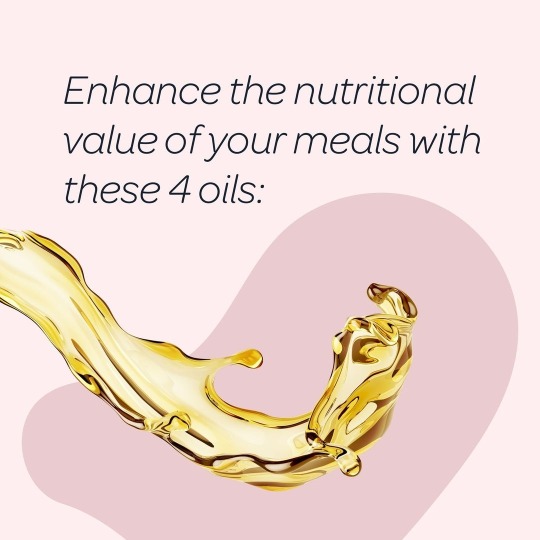
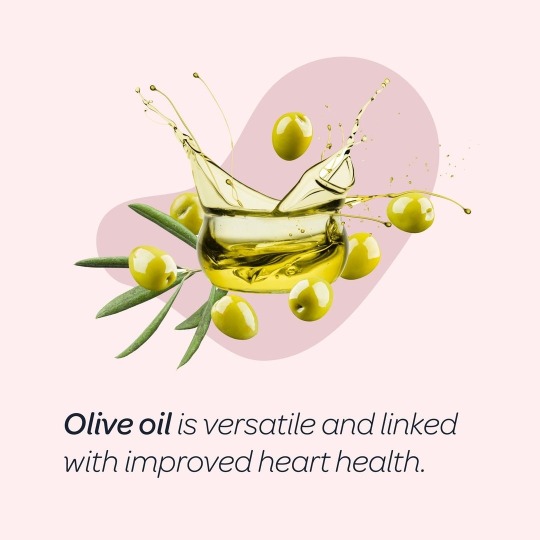

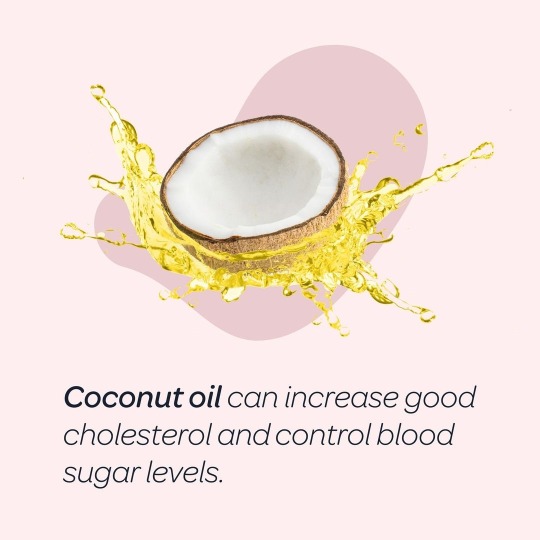
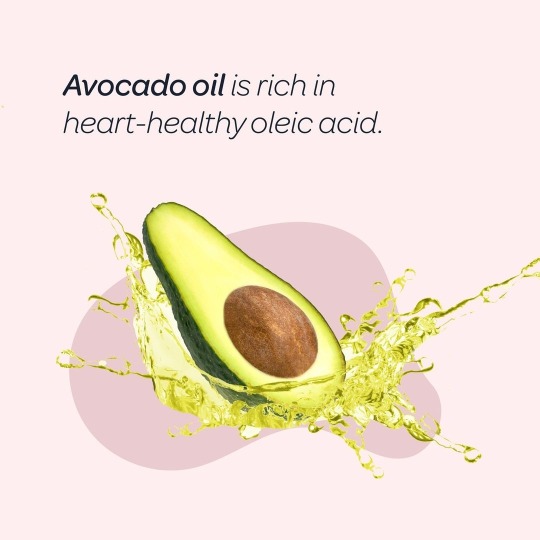
Cooking with oil often gets a bad rap, but not all oils are created equal.
Healthy oils offer many useful benefits when incorporated into a balanced diet. Although it is recommended to avoid highly refined oils that lack essential nutrients such as canola, sunflower, corn and vegetable oil, certain ones should be included in some of your favorite recipes!
Enhance the nutritional value of your meals with these 4 oils:
💛 𝗢𝗹𝗶𝘃𝗲 𝗼𝗶𝗹
Extra virgin olive oil is one of the most versatile oils and many studies have linked it to improved heart health.
💛 𝗚𝗵𝗲𝗲
Ghee, or clarified butter, is a rich source of vitamins, antioxidants, and healthy fats. The milk solids are removed from butter, resulting in a product that contains only beneficial fats and is less likely to cause inflammation.
💛 𝗖𝗼𝗰𝗼𝗻𝘂𝘁 𝗼𝗶𝗹
When used in moderation, coconut oil has the potential to increase good cholesterol and help control blood sugar levels. The medium chain triglycerides (MCT) in coconut oil are thought to be especially beneficial for brain health.
💛 𝗔𝘃𝗼𝗰𝗮𝗱𝗼 𝗼𝗶𝗹
Avocado oil is rich in heart-healthy oleic acid, a monounsaturated omega-9 fatty acid.
Substituting unhealthy oils and fats for these healthy alternatives is a simple and easy way to improve your overall health and well-being!
12 notes
·
View notes
Text
Rise and Shine: 10 Healthy Breakfast Ideas to Start Your Day Right
Introduction: Breakfast is often referred to as the most important meal of the day, and for good reason. A nutritious breakfast not only provides you with the energy you need to kickstart your day but also sets the tone for healthy eating habits. However, finding the time and inspiration to prepare a healthy breakfast can be a challenge amidst busy morning routines. Fear not! In this article, we'll explore 10 delicious and nutritious breakfast ideas that are quick, easy, and perfect for fueling your day ahead.
Overnight Oats: Overnight oats are a time-saving breakfast option that can be prepared the night before. Simply combine rolled oats with your choice of milk (dairy or plant-based), add toppings like fresh fruit, nuts, seeds, and a drizzle of honey or maple syrup, and refrigerate overnight. In the morning, your oats will be soft, creamy, and ready to enjoy.
Greek Yogurt Parfait: Greek yogurt is rich in protein and probiotics, making it an excellent choice for a healthy breakfast. Layer Greek yogurt with fresh berries, granola, and a drizzle of honey for a delicious and satisfying parfait. You can also add additional toppings like sliced almonds, coconut flakes, or chia seeds for extra flavor and texture.
Avocado Toast: Avocado toast has become a popular breakfast staple for good reason – it's simple, nutritious, and incredibly delicious. Mash ripe avocado onto whole grain toast and top with sliced tomatoes, a sprinkle of salt and pepper, and a drizzle of olive oil. For added protein, top with a poached or fried egg.
Veggie Omelette: Eggs are a nutritional powerhouse and a versatile ingredient for breakfast. Whip up a veggie-packed omelette by sautéing your favorite vegetables such as spinach, bell peppers, onions, and mushrooms, then pour beaten eggs over the top. Cook until set, fold in half, and serve with a side of whole grain toast for a filling and satisfying breakfast.
Smoothie Bowl: Smoothie bowls are a refreshing and nutritious breakfast option that allows for endless creativity. Blend together your favorite fruits, leafy greens, and a liquid base such as almond milk or coconut water until smooth. Pour the smoothie into a bowl and top with granola, sliced fruit, nuts, seeds, and a dollop of Greek yogurt for added protein and creaminess.
Chia Seed Pudding: Chia seeds are packed with fiber, protein, and omega-3 fatty acids, making them an excellent addition to your breakfast routine. Make chia seed pudding by combining chia seeds with your choice of milk and sweetener (such as honey or maple syrup) in a jar or bowl. Stir well, refrigerate for at least a few hours or overnight until thickened, and top with fresh fruit or nuts before serving.
Whole Grain Pancakes: Swap traditional pancakes for whole grain pancakes made with whole wheat flour or oat flour for a healthier twist. Serve with sliced bananas, berries, and a drizzle of pure maple syrup for a delicious and nutritious breakfast that's sure to satisfy your cravings.
Quinoa Breakfast Bowl: Quinoa is a protein-rich grain that makes a nutritious base for a breakfast bowl. Cook quinoa according to package instructions and top with sliced fruit, nuts, seeds, and a drizzle of honey or maple syrup for a hearty and satisfying morning meal.
Breakfast Burrito: Wrap scrambled eggs, black beans, diced vegetables, and a sprinkle of cheese in a whole grain tortilla for a portable and protein-packed breakfast on the go. Add salsa, avocado, or Greek yogurt for extra flavor and creaminess.
Cottage Cheese and Fruit: Cottage cheese is high in protein and calcium, making it a nutritious breakfast option. Serve cottage cheese with fresh fruit such as berries, sliced peaches, or pineapple for a simple and satisfying breakfast that's ready in minutes.
Conclusion: With these 10 healthy breakfast ideas, you can start your day off on the right foot and fuel your body with essential nutrients and delicious flavors. Whether you prefer a refreshing smoothie bowl, a hearty omelette, or a simple bowl of overnight oats, there's something for everyone to enjoy. So make breakfast a priority and reap the benefits of a nutritious start to your day.
#Healthy Eating#Breakfast Recipes#Nutritious Meals#Morning Fuel#Balanced Diet#Quick Breakfast#Easy Recipes#Breakfast Inspiration#Delicious Start#Wholesome Breakfast#Breakfast Ideas#Clean Eating#Energizing Meals#Breakfast Bowl#Protein-Packed Breakfast
3 notes
·
View notes
Text
A-Z Cheaters Guide to Facial Oils

Image Credit: Kelly Sikkema on Unsplash
I put together this quick guide with some basic information on single-source oils used in skincare. This is not a comprehensive list of all oils used in skincare, just a list of those commonly used as single-source oils. Some oils have more abundant information than others.
As a review, single-source facial oils are used to add moisture and restore skin's natural barrier. To use, you can add a few drops to your favorite moisturizer and mix in your hands prior to application or you can use oils on their own. Simply put a few drops in your palm to warm, then apply a thin layer to skin.
Some of these oils are quite common and can be found in your average grocery store. Others might only be available from specialty retailers, health food stores, and the like. Remember to check and make sure whatever you're buying is organic and has no additives.
CLICK BELOW FOR A-Z FACIAL OILS AND THEIR PROPERTIES.
Acai
Loaded with vitamins and antioxidants
Good for aging skin
Almond
High in Vitamin E, Zinc, proteins, and potassium
Lighter than olive oil and shea butter
Absorbs easily
Can cause allergic reaction
Soothes dry, irritated skin
Good for regenerating damaged skin cells
Good for dry, acne-prone, and sensitive skin
Apricot
High in Vitamin E and fatty acids
Absorbed easily
May help soften and calm irritated, itchy skin; good for acne prone skin
Anti-inflammatory, antioxidant, anti-aging, antiseptic, and antibacterial
Argan
Good for dry, dehydrated skin
High in Vitamin A and E, monounsaturated fatty acids
May help with the appearance of wrinkles, fading scars, skin texture, and treating acne
Doesn't clog pores
Avocado
High in oleic acid, a monounsaturated fatty acid, and other essential and trace minerals
Good for dry, damaged skin
May increase sebum production
Not recommended for acne-prone skin
Can reduce pore size and remove impurities
Reverse signs of aging
Improve conditions like psoriasis and eczema
Carrot Seed
Antifungal, antibacterial, and anticancer qualities due to flavonoid content
Improves elasticity, tone, and overall appearance
Calms irritated skin; may help with eczema and psoriasis
Slows signs of aging
Castor
Strong purging and detoxing properties
May help with acne; increases cell turnover
Can be drying for some skin types due to ricinoleic acid content
Chia Seed
Works well for all skin types including oily and irritated skin; especially beneficial for sensitive, inflamed, dehydrated skin
Rich with omega-3s and -6s and antioxidants
Patients suffering from xerotic eczema who used a simple cream with 4% chia seed oil for eight weeks found significant relief
Decreases transepidermal water loss
Do not use if allergic to chia seeds
Coconut
Available in two forms: solid or liquid
Do not use refined coconut oil on skin
Absorbs easily
High in Vitamin E and K, fatty acids, and polyphenols
Antifungal, anti-inflammatory, and antibacterial properties
Not good for those with acne
Stimulates collagen production
Evening Primrose
Good for aging skin
Promotes elasticity, anti-inflammatory, enhances skin's cellular structure
Helps lighten skin and reduce hyperpigmentation
May help with acne and balancing hormones when taken orally; often used in menopausal women
Grapeseed
High in Vitamin E, fatty acids
Antioxidant, antimicrobial, anti-inflammatory properties
Good for oily skin
Reduces redness
Helps heal acne scarring
Tones and tightens skin
Protects against sun damage
Reduces the appearance of wrinkles, stretch marks, and blemishes
Hemp Seed
Good for oily skin
Great for dry, itchy skin, psoriasis, and eczema
Tolerated by both oily and sensitive skin
Can help balance oil production
Reduces redness and inflammation caused by acne
Jojoba
Good for dry, dehydrated skin
Technically a wax, not an oil
Mimics skin's sebum (natural oils)
May help reduce oil-production in oily skin, basically by tricking it into thinking it's produced enough; can make a good acne treatment
Absorbed easily
Doesn't clog pores
Marula
Good for dry, dehydrated skin
High in antioxidants
Protects from environmental toxins
Reduces signs of aging and sun damage
Soothing for all skin types
Olive
Slightly heavier moisturizer
Typically doesn't trigger allergic reactions
Can cause/worsen atopic dermatitis for some
High in Vitamins A (natural retinoid), D, E, and K; fatty acids and plant sterols
Antioxidant-rich
Smooths skin texture
Reduces signs of aging, inflammation, and redness
Heals dry skin
Pumpkin Seed
Good for oily skin
Has DHT-blocking properties
Rich in zinc and selenium
Great for fighting acne-causing bacteria
Low chance of clogging pores
Increases firmness
Rosehip
High in Vitamin A (natural retinoid) and C, fatty acids, and other antioxidants
Recommended for sensitive skin, anti-aging
Possible use for eczema
Good for oily, dry, damaged, mature, and irritated skin
May help reverse the effects of sun damage
Improves skin texture
Helps with signs of aging, stretch marks, scars, and hyperpigmentation
Safflower
High in linoleic acid
Great at treating blackheads and other skin impurities
Sesame Seed
Promotes wound healing
Kills acne-causing bacteria
Has great antibacterial properties
Protects against sun damage
Helps skin texture and overall appearance
Allergen risk
Shea Oil/Butter
Available in two forms: solid or liquid
Excellent moisturizer; highly protective against rough skin during dry, cold months
Reduces inflammation; soothes distressed skin
Sunflower Seed
Absorbed easily
High in Vitamin E
Protects skin barrier
Antimicrobial properties
Doesn't cause/worsen atopic dermatitis
Good for irritated skin
Good for most skin types
Balances, moisturizes, and fights signs of aging
Squalane
Lightweight
Derived from sugarcane
Good for sensitive skin
Absorbs easily
Tamanu
Comes from a tree in the pine/evergreen family; strong, pine-like scent
Amazing healing properties
Great for acne spot treatment, healing and fading acne scars
Can be used to fade other types of scarring as well
Good for delicate skin
2 notes
·
View notes